#national gold star mother's day
Explore tagged Tumblr posts
Text
09/29/2024 is European Heritage Day 🇦🇹, World Heart Day ❤️🌎, National Attend Your Grandchild's Birthday 🇺🇸, National Coffee Day ☕️🇺🇸, VFW Day 🇺🇸, National Gold Star Mother's Day 🇺🇸, National Police Memorial Day (ACAB) 🇬🇧, International Day of Awareness on Food Loss and Waste Reduction 🇺🇳

#european heritage day#world heart day#national attend your grandchild's birthday#national coffee day#vfw day#national gold star mother's day#national police memorial day#international day of awareness on food loss and waste reduction
1 note
·
View note
Text
The round 1 polls for the favorite songs tourney
Suddenly I see by KT Tunstall - Misery Business by Paramore
Voodoo by Godsmack - Teenagers by My Chemical Romance
Genie in a Bottle By Christina Aguilera - Life on Mars by David Bowie
Lovefool by the Cardigans - Landslide by Fleetwood Mac
Harness Your Hopes by Pavement - Rent By the Pet Shop Boys
Gotta Get Up by Harry Nilsson - Virtual Insanity by Jamiroquai
It's too Late by Carole King - Romeo and Juliet by the Indigo Girls
A Thousand Miles by Vanessa Carlton - Good Old Fashioned Lover boy by Queen
Technicolor Dreams by the Bee Gees - Me and Bobby Mcgee by Janis Joplin
Maintain the Madness by Jane Austen Argument - The Logical Song by Supertramp
Voulez-Vous by ABBA - Your Day Will Come by Streetlight Manifesto
All Day and All Night by The Kinks - Rule #21 Momento Mori by Fish in a Birdcage
Fuck it by Days N Daze - The City of New Orleans by Arlo Guthrie
Budapest by George Ezra - Riptide by Vance Joy
True Trans Soul Rebel by Against Me! - Father and Son by Cat Stevens
Hungry Dog in the Street by The Taxpayers - Loose Lips by Kimya Dawson
Black Bird by the Beatles - Give Me One Reason by Tracy Chapman
Season of the Witch by Donovan - Volcano Girls by Veruca Salt
Friday I'm in Love by The Cure - Just Dance by Lady Gaga
Somebody Told me by the Killers - You Gotta Die Sometime from Falsettos
Love Me I'm a Liberal by Phil Ochs - Touch Me by the Doors
Ohio by Neil Young - Plate Glass Apology by Apes of the State
Sweet Talkin Woman by Electric Light Orchestra - She Has a Girlfriend Now by Reel Big Fish
The Past Is a Grotesque Animal by Of Montreal - Vienna by Billy Joel
A-Punk by Vampire Weekend - 15-Step by Radiohead
Float On by Modest Mouse - TERF bangs by Butch Baby
Toxic by Britney Spears - American Pie by Don McLean
Call Me Al by Paul Simon - Spiderwebs by No Doubt
Manic Monday by The Bangles - Body by Mother Mother
Monday Monday by The Mama's and the Papa's - Once in a lifetime by the Talking Heads
Rio by Duran Duran - People by AJJ
Bugs by Jesse Welles - Man on the Moon by R.E.M.
Glad to Be Gay by Tom Robinson Band - All Along the Watchtower by Jimi Hendrix
Only Happy When it Rains by Garbage - Diamonds and Rust by Joan Baez
Lyndon Johnson Told the Nation by Tom Paxton - Hot Stuff by Donna Summer
Culling of the Fold by the Decemberists - Video Killed the Radio Star by the Buggles
For What It’s Worth by Buffalo Springfield - Two Headed Boy by Neutral Milk Hotel
Pink Triangle by Weezer - Pink Pony Club by Chappell Roan
(Don't Fear) The Reaper by Blue Öyster Cult - Gold On the Ceiling by The Black Keys
Make your own kinda music by Cass Elliot - Micheal by Franz Ferdinand
Renegade by Styx - Gay Bar by the Electric Six
Major Tom (Völlig losgelöst) - Frank Sinatra by CAKE
Dog Days are Over by Florence + the Machine - The Impression That I get by the Mighty Mighty Bosstones
Unwritten by Natasha Bedingfield - & by Tally Hall
28 notes
·
View notes
Text

By Cameron Dorly | Published by SNN
WESTSIMSTER, Windenburg (SNN) - - The State Opening of Parliament Monday provided a return to reassuring rituals dating back centuries.
The new parliamentary session was opened by Queen Katherine I, in the magnificent setting of the House of Lords, and the 31-year-old monarch was accompanied by her husband, Prince Rainier.
The state opening marks a rare convergence of the House of Lords, the House of Commons, and the monarch.

Queen Katherine departed Buckingham Palace wearing the diamond diadem and vintage Hartnell gown by @warwickroyals. famously worn by Queen Lara-Leigh for her 1912 Simdian Official Portrait.

The queen and Prince Rainier, the Prince consort in the gold state coach moved slowly through the crowded streets toward the House of Parliament.

Her Majesty was escorted by the Household Cavalry.

The queen and Prince consort were also followed by guardsmen on horseback as they moved slowly down The Mall.

A closer shot of the Queen in the state coach as she made her way through the crowded street towards the House of Parliament.

Before Her Majesty arrived, the priceless Imperial State Crown and other regalia used in the ceremony were brought to Parliament in a separate heavily-guarded carriage.

The crown includes 2,868 diamonds, including the Second Star of Niregia diamond, and many other gems. The crown was made for King Edward II’s coronation in 1941, based on a crown designed for King Albert II in 1828.
The heavy crown is a powerful symbol of the queen’s authority.

Queen Katherine I's arrival at the Sovereign’s Entrance in Parliament was carefully choreographed and they were greeted at the door by the Lord Chamberlain, and the House of Lords Majority Leader.

The Queen and Prince Rainier were then escorted to the Robing Room, where she put on the Parliament Robe of State and the Imperial State Crown.

Seated right to left, Rowena, Queen Mother (wearing the Lara-Leigh Lover's Knot tiara), the Duchess of Kent (wearing the Kently tiara), the Duchess of Hastings (wearing the Princess of Windenburg tiara), and the Countess of Boykins (wearing the Lara-Leigh Halo tiara).

Her Majesty then proceeded in State through the Royal Gallery to the House of Lords.

A momentous year for Windenburg, Queen Katherine was certainly kept busy. Her Majesty, more than 2 years into her reign as Queen, is well-liked by the Windenburg public.

The Easton Royals won their 16th World Cup (first since 2021), and Windenburg native, Zen Miller, won Brambledon so spirits are high throughout the sims nation.

Lords waited for the Queen in their ceremonial robes while various Commonwealth dignitaries and ladies were seated as the queen said "My Lords, pray be seated".

Seated on a lower portion of the dais was the Prince consort. Standing behind him was Lady Delilah (the queen's Lady-in-Waiting), Viscountess Glenn Cove (Mistress of the Robes), and Lady Oglethorpe (Lady of the Bedchamber).

A House of Lords official was then sent to summon the House of Commons. The door to the Commons is first symbolically slammed in the officials face, which symbolizes the Commons' independence from the monarchy, before it is opened and they follow him back to the Lords Chamber.

The Prime Minister, the Leader of the Opposition, followed by the First Secretary of State and the Members of the House of Commons begin their processional through the House of Lords

During her speech, Queen Katherine outlined the governments policies for the following year. Prime Minister Linwood Keller and opposition leader Tommy Udaku can be seen at the front of the crowd listening intently.
While the speech fleshed out some of the growth-orientated vision Keller plans to pitch during the upcoming year’s election campaign, it was light on details on other areas, including how Keller would meaningfully bolster Windenburg’s border security before an election campaign is again disrupted by public concern over small boat crossings to the UK.

Part of the speech read:
My Government will give priority in economic policy to controlling inflation through the pursuit of firm monetary and fiscal policies. By reducing the burden of direct taxation and restricting the claims of the public sector on the nation's resources they will start to restore incentives, encourage efficiency and create a climate in which commerce and industry can flourish. In this way they will lay a secure basis for investment, productivity and increased employment in all parts of the United Kingdom. My Government intends to approve extra powers for law enforcement to investigate people smuggling spellcaster potions, including stopping and searching at the border, and the creation of a new Border Security Command.
The Queen and Prince consort returned to the palace but, due to the heavy rain, cancelled the balcony appearance.
#SNN on ts4#ts4#SNN has the tea#simshousewindsor royalty#simshousewindsor on SNN#simshousewindsor Parliament State Opening#simshousewindsor#simshousewindsor ts4#ts4 royalty#ts4 simblr#sims 4 simblr#simshousewindsor monarchy#sims 4#the sims 4#simshousewindsor simblr#sims 4 monarchy#simblr#ts4 monarchy#warwickroyals outfit
26 notes
·
View notes
Text
Last Twilight, episode 1: reflections
TW: suicide
ALLLLLLLLRIGHT! Aof Noppharnach began our year with Moonlight Chicken; interjected it with Our Skyy 2 x Bad Buddy x A Tale of Thousand Stars, and bookends it with Last Twilight. I've got my cha yen ready (not too sweet), here we go, Last Twilight, episode 1.
Some quick notes on random stuff first, then themes I'm picking up on:
1) Yes, we had to have Doc Jimmy start a new series with a new fight, huh (and always in these bowling shirt/jackets, too)
2) Ajahn Pichai with the gold chain, sheeeet! (Listen. It's my OGMMTVC Bad Buddy Meta Month. Just about everyone working on this show on the screenwriting and directing team are BBS alums. The comparisons will be unavoidable!)

3) Why do I know Sea Tawinan? It’s not because I watched Vice Versa (I stayed away), but because he was great in a small role in 55:15 Never Too Late, AND, more importantly, homeboy wore an off-shoulder Fendi sweater WITH a blazer (CLAP EMOJIS) to some GMMTV event, which warmed my couture cockles. Much respect for the taste! (Poor @lurkingshan has had to literally hear about my fashion obsession with this get-up MULTIPLE TIMES, sorry Shan, palms together!)
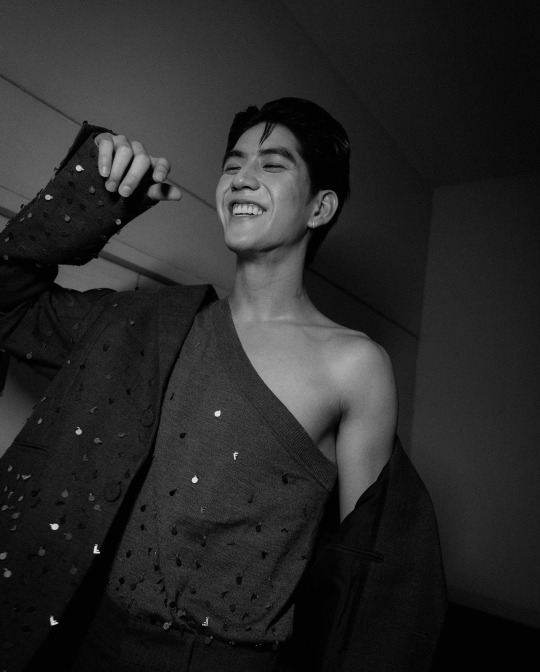
4) Of the few episodes of Midnight Museum and UMG that I watched earlier this year, I was not impressed with Namtan Tipnaree, but I appreciate that she's starting off quite strong and moodily here. (Also, UMG's script did literally no human being any justice.)
@twig-tea has gathered the ragged and burnt out (oh, is that just me, lmao) Ephemerality Squad from the Only Friends meta circle to join them in a Last Twilight Liminality.... what should we call ourselves, the Liminality League? The Liminality Legion? Someone choose! Anyway, I am super down, and ready to start chewing on some themes. Twig captured the big theme of liminality, of time purgatory, and I totally agree with what you've gotten down in your post, Twig.
In the preview episode for this series, Before Last Twilight, we learn that Day has 180 days -- six months -- of vision left. At the same time, Mhok has 180 days -- six months -- to earn enough money to buy back his late sister's car.
In addition to liminality/time purgatory (this is only my coinage, btw, a way in which I can understand the moment in life this show is capturing), we clearly have a theme of cars and movement. Mhok is a mechanic. He wants to keep his late sister's car. The Bimmer that Night is driving is Day's car. Mhok has to get Day home on the back of a motorcycle as Night had to drive away while Day was wandering in the middle of the road. A car can move backwards only very temporarily, and will HAVE to move forwards at any point in time in order to get to another location (..... unless you're a driver from New Jersey, ayooo!). The car belonging to the late Rung is very much in purgatory at the moment.
We have a theme of sibling rivalry between Day and Night. Day was the success of the family, knows it, and hangs it over Night's head. And we have a theme of opposites. Day, Night, blind, seeing. I can play badminton, I cannot play badminton.
(BY THE WAY! We know we'll be reading more into badminton, AND in the rivalry of Day and Night, AND in the rivalry of Sea and Mark in this series, yes? Mark Pakin and Sea Tawinan are both national-level Thai badminton players who chose acting as their careers. They're facing off in some GMMTV BL sports tournament at the end of the year. I hope it's slightly aggressive! In Before Last Twilight, Sea actually made reference to his rivalry with Mark. Ooooh, TESTY!)
While I'm watching closely the tension between Day and Night, I'm also watching for the stress and pressure that caring for Day will put on Mhok, as well as Night and his and Day's mother. As many of us are watching Last Twilight very closely for accuracy and authenticity in reflecting the experience of a disabled person in an unaccommodating environment; I'm also looking to this show to hopefully capture stories of caregiver stress, which is an incredibly real and important phenomenon (relevant articles here and here).
As I always, always harken to in my posts: behavioral change is very real, and very difficult -- especially when behavioral change is forced upon an individual AND/OR a group, all of which contain very different emotional constructions. Day and Night's forced behavioral change, based on Day's vision condition, has very naturally and automatically caused stress in the group dynamic of Day's family system, as we saw in the outburst in Day's car. I wonder how Mhok will deal with that stress, and how he'll manage his own stress vis à vis caring for Day.
Last theme for now, and then some concluding thoughts. Mhok's emotional distance from his sister's suicide. He can't bring himself to connect with it directly.




I'm eating this up. It's certainly Mhok's way of grieving at the moment. He's also talking with his ex-girlfriend in both of these scenes. There's emotional space between him and Rung, between him and Porjai. And certainly there's simmering and unresolved anger as well -- honestly, the whole emotional circle. But Mhok, at this point, is not toeing the line of getting close to those emotions, and is engaging with the memory of his sister with distance, which is bound to be addressed vis à vis his connection with Day.
There's a lot of anger, a lot of regret, a lot of avoidance, a lot of dancing around the honest truth. Mhok and Day are likely conduits of emotional openness and steadiness to each other; we will see how it plays out.
What do I think of JimmySea? I'm not you're average Wai hater -- I really liked Jimmy as Wai in Bad Buddy. Because I didn't watch Vice Versa, I honestly don't know what I think about him in a lead role. So I am going in REAL fresh, knowing nothing about JimmySea's chemistry, and I like what I'm seeing so far, particularly with Jimmy's emotional control. I appreciate having seen a bit of the work they did together in Before Last Twilight to get to this series premiere.
Aof has done this before: he's recognized potential in pairings (specifically in Dark Blue Kiss with TayNew and Still 2gether with BrightWin) to come up with fabulous shows. So I have trust that he knows what he's doing with JimmySea. Let's see. I really like this so far, but Only Friends did indeed burn me out to a crisp, so I'm allowing myself the slightest touch of hesitancy as I get into a new and big GMMTV show.
#last twilight#last twilight the series#backaof noppharnach#last twilight meta#last twilight the series meta#jimmy jitaraphol#sea tawinan#jimmysea#mhok x day#day x mhok#mhokday#namtan tipnaree#film rachanun#good to see film in here#ohm thiphakorn#liminality league#the last twilight liminality league#aof noppharnach
65 notes
·
View notes
Text
nothing in the world belongs to me, but
Shuri/Riri Williams
[Major Character Death] [Alternate Universe - Gods & Goddesses] [Apocalypse] [Period Typical Attitudes] [Goddess!Shuri] [Astronomer!Riri] [Hero's Quest] [Rebirth]
Summary: Her. It was all for Her.
- SHURIRIWEEK2024 - day six - "song fic/ song inspo" - loosely inspired by My Love Mine All Mine
@shuririweek
ao3
----
Oh-- The Earth. It waned.
Dark clouds bore down on the countrymen below. Winds picked up, sharp against their skin--warning them of the storm to come.
Days prior, The Oracle warned The King of the devastation. A disaster brought forth not by man nor nature.
Under the Sea God’s might, entire nations would sink.
Was it for revenge? Indulgence? No one knew for certain why such a curse had befallen the lands. At least, that’s what The Crown had claimed. Tucked behind stone walls draped in ivory and gold. Lofty, safe from the encroaching beast below.
Troops were rallied. Songs of conquest and valor sang. Banners swung, legs marched on.
All clamoring forth into battle--all drowned.
A wrath like no other rising to swallow them whole.
Ships were sent and sank. Cargo barreled into the docks. Sailors dumped onto the rocks. Churches filled-- tithings offered with muddied, waif hands. Prayers went unanswered as the sea levels continued to rise.
No other God was willing to intervene.
Bodies piled up--The King was desperate. A draft was enforced despite the uproar from the people. Nobility scattered, abandoning the towering lights of the sea-side cities for the darkest crevices of the country-side. All who were left--the desperate, the needy, the ill-begotten souls of this cursed land would bear the folly of the crown and his noblemen.
Riri did not cry for her country's plight. She’s cried enough. For her mother she left behind, for her father, friends who left her. If she must grieve this wretched earth, it will be for the hands who toiled it. Never The Crown.
And yet, here she was dying for that Bastard King.
Blood seeped into her mouth. The taste of iron and salt squeezing her lungs. She swam on, limbs heavy even as she discarded her overskirts and bodice. Now she faced the cold with only left in a thin chemise and cap. Another wave swelled, pushing her against the wall of the cave. Riri’s body shuddered, a throbbing pain overtaking the fatigue and numbness.
Eyes weary, she cast her gaze up as darkness threatened to take hold. Even a mind as sharp as hers would falter in these conditions. No one would understand why she’d taken on this quest. She was no Knight. She had no armor. No land, no power to her name.
Only her mind kept her from the pits of irrelevance in a society this cruel. No one could interpret the stars like she could. She spent many nights in the Royal Observatory, hunched over an assortment of lenses. She poured over notes, calculations, renderings--deciphering the distance between earth and those endless depths above.
A fever for knowledge--a sign of madness to others. Smarts did a woman no good afterall. Rumors would speculate that her position only existed to keep her close to the King’s bedchamber without alerting the church.
Riri didn’t care. At the end of the day, her ceaseless research was an act of prayer. Not meant to be understood by others. To dare cast her sights above, to dare know the unknowable. Between the moon’s craters, the stars fading lights, and that space that never ended.
She’d see traces of Her everywhere.
Reverently, she’d write through the night catching glimpses of the Goddess’s presence. A breeze over her shoulder in a windowless room. Shadows that stretched like slender fingers, tracing the curved, ink numbers.
Oh--her Goddess of Moon, of Stars. She who kept the secrets of creation just out of sight--teasing her lowly worshiper.
It was a frantic night of discovery--like many others--that her Goddess finally answered.
It led her here. The bloody depths--her inevitable tomb.
And yet, drifting between consciousness, Riri smiles.
Above, through the cracks of the cave ceiling, the moon shined. Its light cool against her face--a caress like no other.
Around Riri, the water retreated. An arm wrapped around her waist, pulling her upright
Cool lips brushed against her ear-- Riri trembled.
“My curious astronomer…” Shuri whispered, watching a trail of water trickle down the human’s throat, “So bright, so fragile--Will you give up?”
Riri exhaled, squeezing her eyes tight, “Never,” she promised, “If I die…”
Kingdoms would fall--man would crumble--but most importantly--
“How else will I prove you wrong?”
Shuri laughed, surprised by her arrogance, “Oh? About what?”
“That I can never know you,” Riri said, head falling back, “That I can never reach you,”
“But I’m right here, aren’t I?” Shuri teased, a featherlight touch tracing Riri’s temple, “There’s nothing else to find. You’ve see it all,”
“I’ve never seen you,” Riri sighed, relishing the brief relief Her touch brought. She knows if she opens her eyes, if she dares to look back, there will be nothing but moonlight to greet her, “My everything, my eternity… I will not rest until I see you again.”
“Again?” Shuri echoed, lost.
Riri has never seen her in this lifetime. Ever.
Riri didn’t seem to take notice of the strangeness of her words. The prayer, it's promise, so natural on her lips.
Shuri let it pass, “If you insist,” she said, “But you must endure far greater pain,” she kissed Riri’s temple, then cheek--just shy of her lips, “No human can return from where you must go,” she murmured, words reverberating against Riri’s soul.
Shuri’s embrace slipped away.
Clouds covered the moon, marring its face.
Riri was alone again.
And the water rose, eager to swallow--to reduce her body to a corpse desperate for shore. Riri braced herself, taking a moment before she she let her fingers slip. She let herself get dragged down, down deeper.
Fear gripped her--it always did. Riri let it rush over, body jerking as brine spilled into her lips--lungs convulsing.
Riri kept swimming deeper, even as her body bloated to the surface.
Burning clarity pulled her from despair. Every atom buzzed into her awareness as she cast herself down deeper until the water scorched.
Riri gripped the sword buried in the core.
Oh-- The Earth.
It trembled as she became a little greater.
#shuririweek2024#mcu#marvel#shuriri#shuri x riri#shuri#riri williams#shuriri fanfiction#bpwf#black panther#iron heart
34 notes
·
View notes
Text



࣪𓏲ּ ֶָ 𝑤𝑒𝑠𝑡𝑒𝑟𝑜𝑠𝒕𝒗 ⁝ melisa asli pamuk, 33, cis woman, she / her. announcing the arrival of alara of house dayne, the heiress of starfall. whispers among the court name them to be both fierce and vindictive in disposition, and those closest to them speak to their interests in archery. if we bards could compose a song for them, it might tell stories of the light of the full moon illuminating an oasis where huntress waits with a silver bow held in steady hands , its arrow ready to strike ; a change in the winds carrying the promise of divine reckoning. she does not tremble but smiles ; galloping across the desert on a white stallion , you were never made for ivory towers and needed no knight to save you ; a beauty more wild than serene , more sharp than gentle - something mythical lingered within mortal flesh , waiting , raging. the seven whisper to their most devout queen as she sleeps, making her question where their loyalties truly lie. are they right to whisper? for their loyalties truly lie with dorne.

basic information.
official name: alara dayne. nickname: none. noble title: heiress of starfall , lady of starfall. date of birth: march 24. age: thirty-three. birthplace: starfall , dorne. home: starfall. nationality: westerosi. gender: cis woman. pronouns: she / her. orientation: bisexual , biromantic. monikers: starmaiden , lady starfire / starfyre , the star of dorne. languages: the common tongue , fluent. familiar with some essosi dialect. accent: a traditionally dornish accent spoken in a steady , gentle tone infused with warmth.
physical information.
faceclaim: melisa asli pamuk. ethnicity: rhoynar. hair: brown with soft gold highlights. eyes: golden brown. height: five feet , ten inches. build: taller than most women of westeros with a hunter's build, lean, not bulky, muscles visible, particularly in her arms, but not detracting from the lady's elegance. dominant hand: ambidextrous. allergies: none. scars: none. distinguishing features: her height and the birthmark above her lips. clothing style: traditional dornish style regardless of where she currently resides. favors loose and light dresses in warm shades on normal days but oft chooses more revealing outfits when attending events. can also be spotted in pants and shirts when training, horseback riding, or hunting. the jewelry she wears is not excessive, normally limited to a necklace and bracelets. she also has a pair of favorite hairpins that double at daggers in case danger unexpectedly arises.
personality.
positive: fierce , resilient , dauntless , charming , protective , forthright. negative: vindictive , prideful , headstrong , mistrustful , obstinate , temperamental. label: the huntress , the tempest. mbti: entj - the commander. enneagram: 8w7 , the maverick. element: fire. star sign: aries. temperament: choleric. moral alignment: chaotic good. deadly sin: pride , wrath. heavenly virtue : diligence. godly parent: artemis.
drives.
hobbies: archery , horseback riding , hunting , stargazing. religion: very loosely follows the faith of the seven. alliance: house dayne , dorne. personal goals: to protect her son, particularly from the targaryens and anyone who might try using him as a pawn, and free dorne from the targaryen reign. would they choose family or power?: family.
family ties.
father: ruling lord alvar dayne. relationship: tba. mother: ruling lady thalina dayne. relationship: tba. sibling: lord/lady/liege utp dayne. relationship: tba. sister: lady laina dayne. relationship: tba. son: davios sand. relationship: tba. third cousins: house dayne of high hermtiage. relationship: tba.
history.
the darling heiress was never the image of the perfect lady, headstrong and adventurous from a young age, but those of starfall never minded. her parents encouraged her to pursue her interests, teaching her how to ride horses the same time she learned to walk and gifting her a bow and arrow when alara gravitated toward that skill. the responsibilities of heir wasn't nonexistent - she was still expected to attend more traditional lessons, but a balance between freedom and expectations was found. a relief for the lady alara's temper was also observed from a young age after a particularly loud squabble with the septa, who was then quickly replaced, trying to instruct her.
lady thalina, after not having children with her first husband despite trying, adored her daughter, and alara admired her mother in turn. in her youth, wherever the ruling lady went, the heiress often followed. her mother's shadow. her mother's apprentice. though alara wasn't a silent shadow; there were many times that she would voice her opinion during meetings or if she felt her mother was being disrespected, wouldn't hesitate to say so. as alara grew older and was able to travel more, her presence at her mother's side decreased but all it would take was a raven to call the heiress back home, which her mother occasionally did when she wished for her daughter's assistance or perspective and letters wouldn't do.
while she loved starfall, alara felt the pull to see the world beyond. first it was dorne that she explored from the red mountains in the west until she reached sunspear on the eastern coast. but the world stretched beyond her beloved desert so alara continued on, venturing north into westeros and then eventually across the narrow sea. her travels were splintered across the years. she could never be away from home for too long and did not wish to be either.
places where the dragons frequented were often avoided whenever possible. living under targaryen rule had forever been distasteful, and she hoped that within her lifetime, dorne would be free of their beastly overlords. however, a chance encounter with the crown prince and a night shared left alara pregnant. alara did not expect marriage ( could think of no worse fate ) but she hadn't expected that the prince would refuse to acknowledge his son's existence. rage, empowered by motherhood, burned hotter. she remained in dorne since learning she was pregnant, which caused some whispers as she'd become a commonly seen figure in society, and after giving birth to her son, a boy with lilac eyes but, thankfully, medium brown hair. her appearance at the royal wedding was the first time she attended court since she fell pregnant. and whispers now spread like wildfire.
important: while muses can, and likely do, suspect that davios is the prince of dragonstone's son, the only muses who know of his parentage for certain are the dayne family ( and possibly some royal targaryens / council members if they're in the know ) as alara has kept it a secret from everyone else.
headcanons
an excellent horsewoman. alara has pretty much taken over the stables at starfall where she raises her horses. she often goes riding at least once and can grow very restless when her duties or court prevent her from venturing outside a keep's walls. her prized horse is a white mare named dune.
while she does know how to fight with a sword, she does greatly prefer a bow and arrow. she's an extremely skilled archer, both in a fight and when hunting, and can maintain her accuracy when shooting from horseback.
always carries at least one dagger with her, normally strapped to her thigh and hidden from sight.
so, so prideful. she will not forget a slight and is very hesitant to forgive. forgive and forget? no, resent and remember.
is capable of adapting to court and being extremely charming when she wants to be. but her patience for courtly etiquette is limited, though it has grown as she has gotten older. holding her tongue is difficult but she knows she must do it for her family's and dorne's sake. however, she has had a few incidents over the years where a noble has pushed her past her limits and she has snapped at them.
well known for her beauty, which has resulted in her having a handful of flings over the years.
she's still very close to her mother and will go to her when she needs advice. they often discuss matters together, ruling starfall as a team in preparation for the day that alara will be ruling lady.
alara has no desire to put her son on the throne. in fact, she doesn't want the targaryens anywhere near her son. had they actually acknowledged davios when he was born, she might feel differently but now she is steadfast in keeping them away from davios. he is only a dayne in her eyes and once dorne gains there independence, she would want to legitimize him as a dayne.
that being said, alara does believe her son has every right to a dragon egg and does want to see him have a dragon of his own - one that would protect dorne.
wanted connections. | established connections.
10 notes
·
View notes
Text
Anthropologist Zelia Nuttall transformed the way we think of ancient Mesoamerica
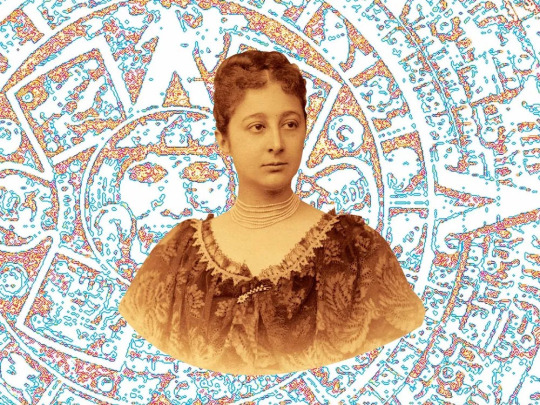
An illustration of the Aztec calendar stone surrounds a young portrait of anthropologist Zelia Nuttall. “Mrs. Nuttall’s investigations of the Mexican calendar appear to furnish for the first time a satisfactory key,” wrote one leading scholar.Peabody Museum of Archaeology and Ethnology, Harvard University
By Merilee Grindle
Author, In the Shadow of Quetzalcoatl: Zelia Nuttall and the Search for Mexico’s Ancient Civilizations
On a bright day early in 1885, Zelia Nuttall was strolling around the ancient ruins of Teotihuacán, the enormous ceremonial site north of Mexico City. Not yet 30, Zelia had a deep interest in the history of Mexico, and now, with her marriage in ruins and her future uncertain, she was on a trip with her mother, Magdalena; her brother George; and her 3-year-old daughter, Nadine, to distract her from her worries.
The site, which covered eight square miles, had once been home to the predecessors of the Aztecs. It included about 2,000 dwellings along with temples, plazas and pyramids where they charted the stars and made offerings to the sun and moon. As Zelia admired the impressive buildings, some shrouded in dirt and vegetation, she reached down and collected a few pieces of pottery from the dusty soil. They were plentiful and easy to find with a few brushes of her hand.
The moment she picked up those artifacts would prove to be pivotal in the life and long career of this trailblazing anthropologist. Over the next 50 years, Zelia’s careful study of artifacts would challenge the way people thought of Mesoamerican history. She was the first to decode the Aztec calendar and identify the purposes of ancient adornments and weapons. She untangled the organization of commercial networks and transcribed ancient songs. She found clues about the ancient Americas all over the world: Once, deep in the stacks of the British Museum, she found an Indigenous pictorial history that predated the Spanish conquest; skilled at interpreting Aztec drawings and symbols, and having taught herself Nahuatl, the language of the Aztecs and their predecessors, she was the first to transcribe and translate this and other ancient manuscripts.

A 19th-century engraving of the pyramids of Teotihuacan. The Pyramid of the Sun was restored in 1910, on the centennial of the Mexican War of Independence. Bridgeman Images
She also served as a bridge between the United States and Mexico, living in both countries and working with leading national institutions in each. At a time when many scholars spun elaborate and unfounded theories based on 19th-century views of race, Zelia looked at the evidence and made concrete connections based on scientific observations. By the time she died, in 1933, she had published three books and more than 75 articles.
Yet during her lifetime, she was sometimes called an antiquarian, a folklorist or a “lady scientist.” When she died, scholarly journals and some newspapers ran notices and obituaries. After that, she largely passed from the public’s eye.
Today, anthropologists often have specialized expertise. But in the 19th century, anthropology was not yet a discipline with its own paradigms, methods and boundaries. Most of its practitioners were self-taught or served as apprentices to a handful of recognized experts. Many such “amateurs” made important contributions to the field. And many of them were women.
She was born in 1857 to a wealthy family in San Francisco, then a fast-growing city of about 50,000 people. Near the shore, ships mired in mud—many abandoned by crews eager to make their fortunes in the gold fields—served as hostels to a restless, sometimes violent and mostly male population. Other adventurers found uncertain homes in hastily built hotels and rooming houses. But the city was also an exciting international settlement. Ships arrived daily from across the Pacific, Panama and the east via Cape Horn.
Her well-appointed household stood apart from the city’s wilder quarters, but the people who lived there reflected San Francisco’s international character. Her mother, Magdalena Parrott Nuttall, herself the daughter of an American businessman and a Mexican woman, spoke Spanish, and her grandfather, who lived nearby, employed a French lady’s maid; a nursemaid from New York; a chambermaid, laundress, housekeeper, coachman and groom from Ireland; a steward from Switzerland; a cook and additional servants from France; and nine day laborers from China.
When Zelia was 8, her family left San Francisco for Europe. Along with her older brother, Juanito, and her younger siblings Carmelita and George, Zelia and her parents set off for Ireland, her father’s native land. Over the course of 11 years, the Nuttalls made their way to London, Paris, the South of France, Germany, Italy and Switzerland. Throughout that time, Zelia was educated largely by governesses and tutors, with some formal schooling in Dresden and London. But her time overseas shaped her interest in ancient history and expanded her language skills, as she added French, German and Italian to her fluent Spanish. All of this expansion thrilled her mind, but it also made her feel increasingly out of step with the expectations for young women of her age. “My ideas and opinions form themselves I don’t know how, and I sometimes am astonished at the determined ideas I have!” she wrote in a November 1875 letter.
She took refuge in singing and tried to be pleased with the few social events she attended. Photos from the time show Zelia as an attractive young woman with large, dark eyes, arched eyebrows and stylishly arranged hair. Nevertheless, she was unhappy. “I was infinitely disgusted with some of the idiotic specimens of mankind I danced with,” she wrote in an 1876 letter after a party.
The Nuttalls returned to San Francisco in 1876, when she was nearly 20. Two years later, she met a young French anthropologist, Alphonse Pinart, already celebrated in his mid-20s as an explorer and linguist. He had been to Alaska, Arizona, Canada, Maine, Russia and the South Sea Islands. Pinart may have led the family to understand that he was wealthy. In fact, he was almost penniless, having already spent his significant inheritance.
They were married at the Nuttall home on May 10, 1880. During the next year and a half, the couple traveled to Paris, Madrid, Barcelona, Puerto Rico, Cuba, the Dominican Republic and Mexico. Pinart introduced Zelia to a burgeoning academic literature in ethnology and archaeology, and she began to understand the theories of linguistics. She found 16th-century Spanish hardly a challenge as she consulted annotated codices—pictorial documents that traced pre-Columbian genealogies and conquests in Mesoamerica. While Pinart dashed from project to project and roamed widely among countries, tribes and languages, Zelia began to demonstrate an intellectual style that was more focused and precise.
Despite the excitement of discovery, something began to go wrong in the marriage. Hints of Zelia’s distress can be found in her effusive letters home. There was, for example, the shipboard admission that her husband was less attentive than she had anticipated. She noted that he was “so quiet and undemonstrative” that it was hard to imagine they were newly married. Some fellow passengers thought they were brother and sister—an odd assumption to make, even in Victorian times, about newlyweds.
By contrast, Zelia is nowhere to be found in Pinart’s surviving correspondence. On April 6, 1881, she gave birth to a daughter, Roberta, who lived only 11 days. To add to this melancholy time, her beloved father died in May, leaving her doubly devastated. A letter Pinart wrote to a friend just a few months later from Cuba appeared on stationery with a black border, signifying mourning, but he made no reference to his wife, her father or their child.
Zelia found solace in learning about her heritage when she and Pinart traveled to Mexico in 1881. She was eager to see her mother’s homeland and to hone her understanding of its pre-Columbian cultures. While Pinart carried out his own research, she began to learn Nahuatl, and she toured villages where dialects of the language were still spoken and ruins where the marks of the past could still be found.
The couple returned to San Francisco on December 6, 1881. By then, Zelia was pregnant again. In late January, Pinart set out to spend several months in Guatemala, Nicaragua and Panama, while Zelia awaited the birth of her second child, Nadine, at her mother’s house.
What finally drove Zelia to sue for divorce, on the grounds of cruelty and neglect, remains elusive. She may have felt that Pinart had married her for access to her family’s fortune. Many years later, she angrily informed Nadine that Pinart had spent the $9,000 she had inherited from her father as well as her marriage settlement. When the money was gone, and when her family was firm that he shouldn’t expect any more, he abandoned his wife and child. Once Zelia demanded a separation, he did not contest it, though obtaining the divorce was a long process that started soon after the couple’s return from their travels and didn’t conclude until 1888.
In later life, Nadine Nuttall Pinart would reflect on how much it had cost her to grow up without a father. “From the time before I can remember, he was taboo to me,” she wrote in a 1961 letter to Ross Parmenter, a New York Times editor who wrote numerous books about Mexico and developed a fascination with Zelia Nuttall. “I was frightened by the violent scoldings I got for mentioning his name. Later, I compromised with myself and when asked about him quietly said, ‘I never knew him!’ I realized that people thought he was dead and were sorry for me and said no more. In those days it was a disgrace to have a divorced mother.”
If the period between 1881 and 1888, when Zelia finalized her divorce, was fraught with tension and heartache, this was also when she set about redefining herself as a woman with a vocation. She spent five months in Mexico with her mother, her daughter and her brother between December 1884 and April 1885, visiting Cuernavaca, Mexico City and Toluca, and exploring archaeological ruins. It was during this time that Zelia made her fateful winter visit to Teotihuacan and acquired her first artifacts.
The pieces of pottery she picked up that day were small terra-cotta heads. They were abundant in the area among the pyramids. At the time, the site was still being used as farmland, and the artifacts came to the surface during ploughing. The heads themselves were an inch or two long, with flat backs and a neck attached. Scholars before Zelia—Americans, Europeans and Mexicans—had mused creatively about such relics, describing differences in their facial features and the variety of headdresses they had sported. Drawing on 19th-century fascination with the topic of race, the French archaeologist Désiré Charnay became convinced that he could see in them African, Chinese and Greek facial features. Charnay mused: Had their creators migrated from Africa, Asia or Europe? And if racial identity was a marker of human development, as many believed at the time, what might this curious mixture of features reveal about civilizations in the Americas?
This kind of thinking was typical. Mistaken ideas about Darwinism led many Western scholars to believe that civilizations evolved along a linear, hierarchical path, from primitive villages to ancient kingdoms to modern industrial and urban societies. Not surprisingly, they used this to legitimize beliefs about the superiority of the white race.
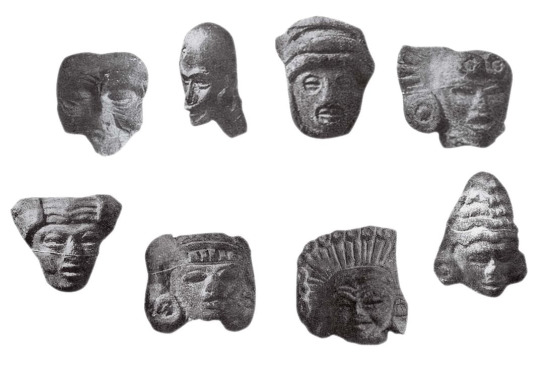
Zelia Nuttall divided her collection of terra-cotta heads into three classes. The first included rudimentary efforts to represent a human face (as seen above, far left). The second class (including the bald second head from the left above) had holes for attaching earrings and other ornaments. The third category included the rest of the heads pictured here, sporting what Zelia called “a confusing variety of peculiar and not ungraceful headdresses.” Public Domain
Zelia generally accepted her era’s assumptions about race and class, and she was comfortable with her elite status and its privileges. Yet in her research, she did not categorize civilizations as primitive, savage or barbaric, as other scholars did, nor did she indulge in racial theories of cultural development. Instead, she sought to sweep aside this kind of speculation and replace it with observation and reason.
The more Zelia examined her terra-cotta heads, the more she realized she needed guidance from someone who had more experience in the study of antiquity than she had. At the time, there were no departments of anthropology in colleges or universities, no degrees to be earned, no clear routes to building a career. To pursue her burgeoning interest in the ancient civilizations of Mexico, and to decipher the meaning of an assortment of terra-cotta heads, she contacted Frederic Ward Putnam, the curator of Harvard’s Peabody Museum of Archaeology & Ethnology and a leading expert on Mesoamerica. He agreed to meet her in the fall of 1885. The meeting was all she hoped for: Putnam warmed to her work and encouraged her to follow her intuitive grasp of how to observe and interpret evidence.
Putnam’s regard for women’s intellectual capacities was clear. He was one of a small number of Harvard researchers who gave lectures at “the Annex,” an institution established for women who had passed the college’s admissions test but were not allowed to attend classes or earn a degree. (The Harvard Annex eventually became Radcliffe College.) He hired a resourceful administrative staff of women and encouraged them to play a role in managing the museum. He also had a “correspondence school,” which he conducted through a widespread exchange of letters. As he once wrote, “Several of my best students are women, who have become widely known by their thorough and important works and publications; and this I consider as high an honor as could be accorded to me.”
Within months of their first encounter, in late 1885, Putnam asked Zelia to become a special assistant in Mexican archaeology for the Peabody. Less than a year later, in the annual report of the Peabody Museum, he wrote about her appointment in glowing terms: “Familiar with the Nahuatl language … and with an exceptional talent for linguistics and archaeology, as well as being thoroughly informed in all the early native and Spanish writings relating to Mexico and its people, Mrs. Nuttall enters the study with a preparation as remarkable as it is exceptional.”
With guidance from Putnam, Zelia wrote an investigation of the terra-cotta heads, her first published scientific report, which appeared in the spring 1886 issue of the American Journal of Archaeology. “At the first glance,” she wrote, “the multitude and variety of these heads are confusing; but after prolonged observation, they seem to naturally distribute themselves into three large and well-defined Classes.”
Each class, she theorized, had been created at a different time and represented a different stage in the culture. The first class contained “primary and crude attempts at the representation of a human face.” The second class included the first efforts at artistry. Her inspection revealed “holes, notches and lines,” suggesting ways in which tiny headdresses, feathers or beads could have been attached to the heads, and noted traces of several colors of paint and different kinds of clay.
The third class was the most important, Zelia argued, because of the quality of the molding and carving. This class had “modifications of feature sufficient to give every specimen an individuality of its own,” she wrote. “The faces are invariably in repose, in some the eyes are closed … faces young and smooth, others very elongated, some with sunken cheeks, others with wrinkles.”
By comparing these terra-cotta heads with ancient pictographs and writings, she showed that some of the heads represented children while others depicted young men, warriors or elders. Others showed the distinct hairstyles described in the writings of Bernardino de Sahagún, a 16th-century Franciscan friar who spent 50 years studying the Aztec culture, language and history. “The noblewomen used to wear their hair hanging to the waist, or to the shoulders only. Others wore it long over the temples and ears only,” Sahagún had written. “Others entwined their hair with black cotton-thread and wore these twists about the head, forming two little horns above the forehead. Others have longer hair and cut its ends equally, as an embellishment, so that, when it is twisted and tied up, it looked as though it were all of the same length; and other women have their whole heads shorn or clipped.”
These concrete observations allowed Zelia to challenge popular ideas about the supposed African, Asian, European or Egyptian origins of the “races” in the Americas. For example, by studying the ornamentation the heads displayed, she was able to identify the person or god each artifact represented and interpret its ritual or symbolic purpose. One clearly corresponded with Tlaloc, the pan-Mesoamerican god of rain, who had been shown in the pictographs with a curved band above the mouth and circles around the eyes. Another head, molded with a turban-like cap, corresponded with the goddess Centeotl; Zelia speculated that the clay turbans once had real feathers attached. She also noted the significance of various poses. “In the picture-writings, closed eyes invariably convey the idea of death,” she wrote.
The article revealed how Zelia intended to be seen as a scholar. First, she made it clear that she had read what others had written. Then she revealed that she would go beyond existing speculation to answer questions that had puzzled others; hers was to be original and important work.
In 1892, Zelia presented a paper in Spain about the Aztec calendar stone. Buried during the destruction of the Aztec Empire, the calendar stone had been unearthed in December 1790, when repairs were being made to the Zócalo, Mexico City’s central plaza. The sculpted stone, some 12 feet in diameter and weighing 25 tons, became a popular attraction exhibited in the Mexico City Cathedral, steps from where it had been found. Antonio de León y Gama, a Mexican astronomer, mathematician and archaeologist, had written about its discovery and praised the intelligence of the Aztecs who had created it. Alexander von Humboldt, who saw the stone when he visited Mexico in 1803-1804, included a drawing in his Views of the Cordilleras and Monuments of the Indigenous Peoples of the Americas, published in 1810, and encouraged Mexican intellectuals to study the meaning of its concentric circles and numerous glyphs. Many others took on its puzzles in the years that followed.
At the time of Zelia’s presentation, the Mexican upper classes were carefully crafting a new national image—a story that would allow Mexico to take its place among the modern nations of the world. The Aztecs, Maya, Olmecs, Toltecs, Zapotecs and other cultures had left their imprints throughout the country in magnificent temples, enigmatic statues, gold jewelry, jade figurines and painted murals. This history was reclaimed as a national heritage every bit as glorious as those of Greece and Rome. A statue of Cuauhtémoc, the Aztec king who resisted Cortés, took its place on Mexico City’s elegant Paseo de la Reforma in 1887. The calendar stone had been installed in a place of honor in the National Museum in 1885. But little was known about the actual customs and beliefs of those ancient people.

The Aztec calendar stone, a central focus of Zelia’s research, has been on display at Mexico City’s National Museum of Anthropology since 1885. Alamy
With her extraordinary knowledge of surviving codices, Zelia offered a novel “reading” of the giant calendar stone that had stumped others and provided new insights into the annual and seasonal cycles of daily life in ancient Mexico, illuminating the cosmology, agriculture and trade patterns of the Aztecs. She presented another version of the paper at the World’s Columbian Exposition in Chicago in 1893.
Zelia returned to Mexico City in February 1902, and after a personal audience with Mexican President José de la Cruz Porfirio Díaz, arranged by the U.S. ambassador, she embarked on a spree of travel to archaeological sites she had long wanted to visit. In May, she and 20-year-old Nadine joined friends at the Oaxacan ruins at Mitla, a religious center, where the “place of the dead” harbored both Mixtec and Zapotec art and architecture. On this dry, high plain ringed by mountains, Zelia strolled across vast stone patios, inspected the elaborate geometric friezes that lined and decorated them, explored temples and imagined a sophisticated society of kings, priests, nobles, artisans and farmers.
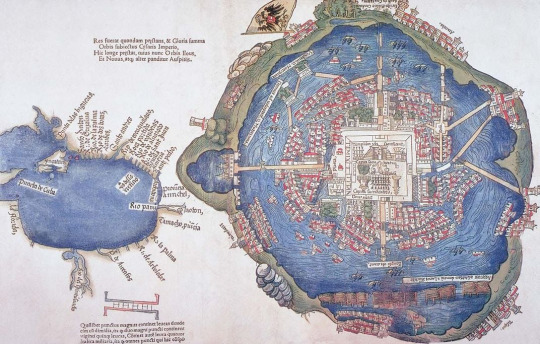
When the Spaniards arrived in Mexico in the 16th century, the Aztec Empire dominated the area. This map of its largest city, Tenochtitlan (now the historic center of Mexico City), was printed in 1524 in Nuremberg, Germany, likely based on a drawing by one of Hernán Cortés’ men. It shows the city’s elaborate network of roads, bridges and canals, complete with aqueducts and bathhouses. The Spaniards executed the last Aztec ruler, Moctezuma II Xocoyotzin, and forced his people to convert to Catholicism. Alamy
Zelia was welcomed into the international community of anthropologists in Mexico. She and Nadine traveled in the Yucatán with the young American anthropologist Alfred Tozzer, where they were beset by frequent rain and terrible roads. Arriving tired and wet in a small town, Tozzer, who would one day chair Harvard’s department of anthropology, was impressed by the women’s resilience. “Imagine the picture,” he wrote to his family on April 8, 1902. “Mrs. Nuttall, never accustomed to roughing it, a woman entertained by the crowned heads of Europe, sitting at a bench with the top part of my pajamas on drinking chocolate and her daughter with a flannel shirt of mine on doing the same.”
After a few months, Zelia and her daughter returned to Mexico City and purchased a mansion they called Casa Alvarado, in the upscale suburb of Coyoacán. The grand house never failed to impress. Frederick Starr, an anthropologist from the University of Chicago, was one of many who found the palace beautiful and restful: “We rode out to Coyoacán where we found Mrs. Nuttall and her daughter really charmingly situated. The color decoration is simple and strong. Nasturtiums are handsomely used in the patio and balcony effects. … While Mrs. Nuttall dressed, Miss Nuttall showed us through the garden, where a real transformation has been effected.”
Living in Mexico energized Zelia. In addition to her affiliation with Harvard, she had funding to travel and collect artifacts for the Department of Anthropology at the University of California. “With me here, in touch with the government and people, I think that American institutions can but profit and that I can do some good in advancing Science in this country,” she confided to Putnam.
Impressed by her knowledge of the country’s past, public officials and foreign visitors came to see her and listened carefully as she led them around her home and garden, explaining the collection she was busy assembling. Her garden, patio and verandas were home to an increasingly large number of stone artifacts, a beautiful carving of the serpent god Quetzalcóatl, revered for his wisdom, among them. She took up “digging” near Casa Alvarado, an activity one guest later recalled fondly. “Every morning after breakfast Mrs. Nuttall would give me a trowel and a bucket. She herself was equipped with a sort of short-handled spade, and we would go out into the surrounding country and ‘dig.’ We mostly found broken pieces of pottery, but she seemed to think some of them were significant, if not valuable. … She was a very handsome woman and very charming. She lived in great style, with many Mexican servants.”
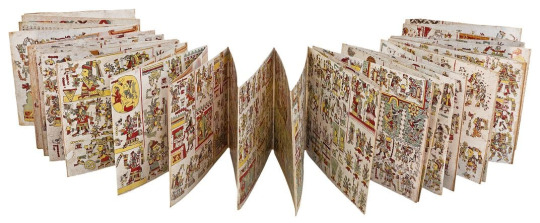
The Codex Borgia, an accordion-folded document of Aztec life, was brought to Europe during the Spanish colonial period. Made of animal skins and stretching 36 feet when unfolded, the codex catalogs different units of time and the deities associated with them. It also includes astrological predictions once used for arranging marriages. Zelia drew on the codex to help her decode the Aztec calendar. Courtesy Ziereis Facsimiles

A section from the Codex Borgia
Zelia continued to travel throughout the country. She found a 14-page codex painted on deerskin, with commentary in Nahuatl, that she believed so valuable that she bought it with her own money, selling some of her possessions to afford it. “Owing to my residence here I must keep it a profound secret that I possess and sent out of the country this Codex,” she wrote to Putnam.
While she was not above smuggling treasures out of Mexico, Zelia also worked in the National Museum, contributing to its displays and archives, and she became an honorary professor of the institution.

Zelia had never owned a home until she bought Casa Alvarado in 1902. In a letter, she described the property as “a beautiful old place with extensive gardens.” Smithsonian Archives
Her Sunday teas at Casa Alvarado were a study in salon orchestration. “She would have 30 or 40 people and she would change the groups she invited,” one visitor recalled. “Sometimes they were all people who knew each other. Or else she would bring people together she wanted to introduce to each other. They weren’t like old-style Mexican parties, with all the women on one side and men on the other. The men and women were mixed together.”
According to an oft-repeated legend, at one of her soirées, she advanced to welcome an eminent guest just as her voluminous Victorian drawers came loose and dropped to her ankles. She calmly stepped out of them and proceeded as if nothing had happened. Zelia was, above all, self-confident.
Zelia Nuttall left Mexico during the early months of 1910 and did not return to her beloved Casa Alvarado for seven years. Throughout that time, Mexico was in the midst of a violent revolution. As many as two million people lost their lives in the ten-year conflict, and the country’s infrastructure was reduced to tatters. Even after the end of the most extensive violence, turmoil erupted sporadically until the late 1920s.
By then, visitors to Casa Alvarado agreed that Zelia was rooted in a bygone era. She was a middle-aged woman with thick glasses who favored shawls, laces and jet beads. Her palace was still filled with stuff only a Victorian could accumulate, but Mexico was telling new stories about itself.
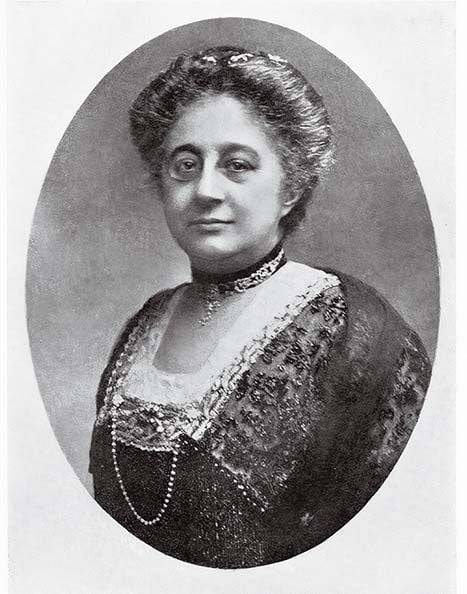
The writer D.H. Lawrence used Zelia as a model for a fictional character—“an elderly woman, rather like a Conquistador herself in her black silk dress and her little black shoulder-shawl.” Antropo Wiki
The elites of the previous generation had asserted that descendants of the Aztec, Maya and other civilizations deteriorated into poverty and abandon. Young artists and intellectuals now rejected this belief. In Diego Rivera’s vast public murals, he showed the people of Mexico being ground into poverty and submission by Spanish conquistadors, a rapacious church, foreign capitalism, the army and cruel politicians. Quetzalcóatl replaced Santa Claus at the National Stadium; Chapultepec Park hosted Mexico Night.
Zelia did not like the revolution and she did not approve of what came after it. She did not celebrate the masses; she believed in hierarchy and a natural order of classes and races. Yet she was determined to be relevant to a new era in Mexico. Casa Alvarado became a meeting place for politicians, journalists, writers and social scientists from Mexico and abroad, many of whom came to witness the possibilities of change in the aftermath of a people’s revolution.
Nevertheless, the stubborn elegance of Casa Alvarado in the 1920s was clear testimony that Zelia was not willing to give up her lifestyle. When the French American painter Jean Charlot was a guest at one of Zelia’s teas, he was aghast at the Mexican servants in white gloves.
When Zelia Nuttall died in 1933, the U.S. consul in Mexico City wrote to Nadine—by then a 51-year-old widow living in Cambridge, England—assuring her that they’d given her mother a tasteful funeral. “Your Mother was very highly thought of here, as evidenced by the floral offerings and the number of her friends who came to the funeral service at the cemetery, it being estimated that about one hundred persons were present.”
By that time, the field of anthropology was dramatically changing, becoming more systematic and organized. Those who entered the field in the 1920s and 1930s built expertise in the classroom and under supervision in the field, passing a variety of tests and milestones determined by academic experts and acquiring a credential as proof of the right to pursue these inquiries. With these rigorous new standards, they asserted their superiority as scholars over those of Zelia’s generation.
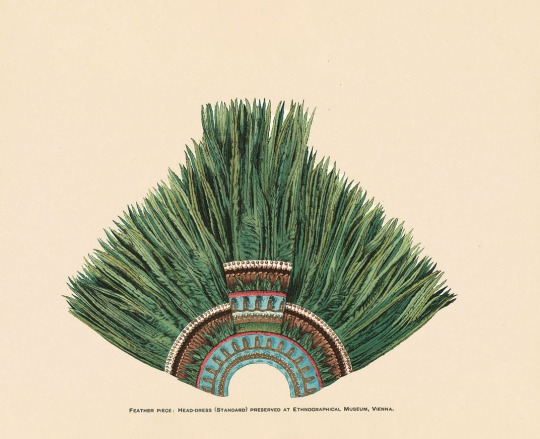
Researchers thought this item at Vienna’s Museum of Ethnology was a “Moorish hat” before Zelia identified it as a Mesoamerican headdress. Alamy
Yet Alfred Tozzer, in his memorial in the journal American Anthropologist, reflected that Zelia “was a remarkable example of 19th-century versatility.” She was wrong in some of her overarching theories. For instance, she fallaciously argued that ancient Phoenician travelers had carried their culture to Mesoamerica. But she was right about many other things. Through her letters, articles and books, we can trace what she got right and what she got wrong as a scholar, and we can follow her as she moved from one research obsession to the next.
Her private life is harder to grasp. Among all the artifacts, there is little about the quips and gossip she exchanged with friends, the piano music she liked to play and sing. We cannot know what was in the boxes of papers in the cellar of Casa Alvarado that were burned in the housecleaning undertaken by its new tenants. We cannot retrieve personal and public documents lost in the San Francisco earthquake in 1906.
What we do know is that she had to make sacrifices, often very personal ones. We can feel her vulnerability, uncertainty, anger and embarrassment in the letters she wrote, as well as her self-assuredness. It required unusual self-discipline to learn so many languages and to gain a mastery of ancient pictographs. Her almost constant travels imperiled her health even while they advanced her vast network of friends, colleagues and patrons. But she continued to work, and that work helped establish the foundation on which many others now build.
A single mother pursuing a career while looking after a family in a man’s world: In some ways, Zelia Nuttall was a very modern woman.
Adapted from In the Shadow of Quetzalcoatl: Zelia Nuttall and the Search for Mexico’s Ancient Civilizations by Merilee Grindle, published by The Belknap Press of Harvard University Press. Copyright © 2023 by Merilee Grindle. Used by permission. All rights reserved.
#Women in history#Women in Anthropology#Zelia Nuttall#The Aztecs#Merilee Grindle#In the Shadow of Quetzalcoatl: Zelia Nuttall and the Search for Mexico's Ancient Civilizations#Books by women#Books about women#teotihuacan#mesoamerica#Nahuatl#Published women#Many of the first anthropologists were women#Alphonse Pinart was just another man who blew through his money#Women's careers flourishing after dumping a parasitic man#Frederic Ward Putnam#Men who encouraged women#The Annex#Lady scientist
45 notes
·
View notes
Text
December 25
Matthew 2:10-11 When they saw the star, they rejoiced with exceeding great joy. And when they were come into the house, they saw the young Child with Mary His mother, and fell down, and worshipped Him: and when they had opened their treasures, they presented unto Him gifts; gold, and frankincense, and myrrh.
Galatians 3:26 In Christ Jesus you are all children of God through faith.
Philippians 1:6 Being confident of this very thing, that He which hath begun a good work in you will perform it until the day of Jesus Christ:
John 17:18 As Thou hast sent Me into the world, even so have I also sent them into the world.
Hebrews 12:25 See to it that you do not refuse Him who speaks. If they did not escape when they refused him who warned them on earth, how much less will we, if we turn away from Him who warns us from heaven?
Acts 5:29 Peter and the other apostles replied: “We must obey God rather than men!”
May you know that the Lord, Who rules over all, is fiercely possessive over you, causing His rage and great fury to fall on those who hurt you. His love for you is passionate and strong, for He is willing to die for you so that a way may be opened for you to come into His kingdom. He is also burning with jealousy over you, not willing for you to share your love with another or divide your loyalty between two masters. Turn, therefore, from your old ways to dedication of deed, to purity of purpose, to singleness of heart and to devotion of will toward the Lord your Creator, Savior, and Redeemer. Zechariah 8
May you hear the Lord when He calls and may you go when He directs, for though it is a marvel to you when God moves in your life, it is not a stretch or a strain for Him. Thus, you will be among His people and He will be faithful and righteous to you as your God. Zechariah 8
May you be strong in the work of the Lord, the building of His temple and the shaping of His living stones, as we learn to fit together, mutually supporting each other. In this way, we will all come into a unity of the faith, having love one for another, creating a safe and accepting place of grace for His lost and wounded sheep to find refuge and healing, and experience the blessings of God in abundance as an inheritance of the Lord. Zechariah 8
May you know that the judgments of God are just and righteous, for as you have been an object of scorn, derision and cursing among the nations, so the Lord will save you, and you will be a blessing; only fear not but be let your hands be strong. Zechariah 8
May you not be afraid of the anger of the Lord when you have returned to Him in humility, repenting of the former works of the flesh, which He hates. Even as you have determined to speak the truth to each other, and render true and sound judgment in your decisions, so He has determined to do good again to you. Zechariah 8
Rejoice in the freely-given gift of My presence with you. Emmanuel. My presence makes any place a royal palace, a holy throne-room. An unremarkable space, offering only respite from the wind for animals and gathering dung as a result, gets portrayed and honored on yards and in homes around the world, because I was there. Emmanuel. Draw Me to yourself by your willing desire to receive Me just as you are. Know that the struggles that accompany My arrival are normal, and will not last, but joy will come and the pain will be forgotten. Emmanuel. Allow Me to grow and mature in you, affecting and aligning your thoughts and intentions, revealing the grace and strength of My truth, that you may walk in wisdom before Me as you overcome and vanquish the foes that battle against you. Emmanuel. Lift Me up before others, making much of Who I am and what I bring, though it does not play out the way your mind would like. Allow My love to appear, and My kindness to manifest, even in the face of rejection, for that IS the victory and the conquest of the final foe, the fear of death to self. Emmanuel. I will arise, bearing life for each one who has sheltered Me and light for all who have embraced Me, strength for those who have endured and victory for those who have resisted, welcoming you into My Father's family and abiding with you forever. Emmanuel.
May you confess with the saints around the throne that the judgments of the Lord God Almighty are true and just, even as He is the Holy One throughout eternity. Revelation 16
May you remain alert and focused on the Lord, ever attentive to what His Spirit is saying, daily putting on His robes of righteousness, the armor of God, and the cloak of the zeal of the Lord, that you may be blessed with no shame at the time of His coming. Revelation 16
May you praise the Lord your Rock, Who trains your hands for war and your fingers for battle, for He is your loving God and your fortress, your stronghold and your deliverer, your shield, in Whom you take refuge and by Whom your enemies are subdued. Psalm 144
May you have the confidence and boldness to come before the throne of God in the name and the righteousness given to you by Christ Jesus, no longer living as though your days are like a fleeting shadow, but calling upon the Lord to part the heavens and come down, touch the mountains so that they smoke, send forth lightning and scatter the enemies, shoot His arrows and rout His foes, reaching down His hand from on high to rescue you from the mighty waters and deliver you from the hands of foreigners whose mouths are full of lies and whose right hands are deceitful. Psalm 144
3 notes
·
View notes
Text

Chapter Two. The Culture of Despair
They attacked liberalism because it seemed to them the principal premise of modern society; everything they dreaded seemed to spring from it: the bourgeois life, Manchesterism, materialism, parliament and the parties, the lack of political leadership. Even more, they sensed in liberalism the source of all their inner sufferings. Theirs was a resentment of loneliness; their one desire was for a new faith, a new community of believers, a world with fixed standards and no doubts, a new national religion that would bind all Germans together. All this, liberalism denied. Hence, they hated liberalism, blamed it for making outcasts of them, for uprooting them from their imaginary past, and from their faith. —Fritz Stern, The Politics of Cultural Despair:A Study in the Rise of the Germanic Ideology [47]
Stories of rage are first stories of despair.
Jeniece Learned stands amid a crowd of earnest-looking men and women, many with small gold crosses in the lapels of their jackets or around their necks, in a hotel lobby in Valley Forge, Pennsylvania. She has an easy smile and a thick mane of black, shoulder-length hair. She is carrying a booklet called Ringing in a Culture of Life. The booklet has the schedule of the two-day event she is attending organized by the Pennsylvania Pro-Life Federation. The event, says the booklet, is “dedicated to the 46 million children who have died from legal abortions since 1973 and the mothers and fathers who mourn their loss.”
Learned, who drove five hours from a town outside of Youngstown, Ohio, was raised Jewish. She wears a gold Star of David around her neck with a Christian cross inset in the middle of the design. She stood up in one of the morning sessions, attended by about 300 people, most of them women, when the speaker, Alveda King, niece of Dr. Martin Luther King Jr., asked if there were any “postabortive” women present. Learned runs a small pregnancy counseling clinic called Pregnancy Services of Western Pennsylvania in Sharon, where she tries to talk young girls and women, most of them poor, out of abortions. She speaks in local public schools, promoting sexual abstinence rather than birth control as the only acceptable form of contraception. And in the fight against abortion and in her conversion, she has found a structure, purpose and meaning that previously eluded her.
Her life, before she was saved, was chaotic and painful. Her childhood was stolen from her. She says she was sexually abused by a family member. Her father left her mother when Learned was12. She says her mother periodically woke her and her younger sister and two younger brothers in the middle of the night to flee landlords who wanted back rent. The children were bundled into the car and driven in darkness to a strange apartment in another town. Her mother worked nights and weekends as a bartender. Learned, the oldest, often had to run the home.
“There was a lot of fighting,” she says. “I remember my dad hitting my mom one time and him going to jail. I don’t have a lot of memories, mind you, before eighth grade because of the sexual abuse. When my dad divorced my mom, he divorced us, too.”
Learned said she learned to repress and contain her emotions. She remembers sitting bewildered at a meal with the family member who had molested her the night before and wondering why he treated her with ice-cold disdain. Her younger sister, who was sexually abused by another member of the family, eventually committed suicide as an adult, something Learned also considered. Suicide seemed, as she grew into adulthood, a release, the only road out of the hell of her existence.
“My grandfather committed suicide, close family members tried suicide,” she says. “In my family, there was no hope. The only way to solve problems when they got bad was to end your life.
“My family put the ‘dys’ in ‘function,’” she adds. “I had relatives switching husbands and wives with other couples. I am so thankful that God moved me 3,000 miles away. I am so thankful He pulled me out of that. Because I am so glad my children…you know, when I was pregnant with my daughter, I said, ‘God, just break the chains…just break the chains.’ And He has. My children have no idea about the dysfunction I lived through. I really truly believe that Satan got a hold of my family early on. I feel like Satan had this huge grip.”
The instability and abuse, the constant moving, saw her retreat into herself. By the time she graduated she had attended three high schools. She was an angry young woman. At 15 she became pregnant. She had an abortion, using the name of her school bus driver to get into the clinic.
“Between being sexually abused, my parents being divorced, my mom being gone all the time, my brothers giving my mom such a hard time, my mother was always in a bad mood,” she says. “I was criticized and put down a lot. I was never good enough. Things were never good enough. The only time I got love was when my mom was taking me to these photo shoots and beauty pageants, and really pushing modeling. And the only time I got love from my mom is when I would win beauty pageants.”
Learned moved out of the house before she was 18, drifted and ended up in Beverly Hills, working nights in a strip club wearing a leotard and French corset. At one point she was homeless and called a family member for a place to stay. On the ride over, driving her 1968 Volkswagen Beetle, she thought of veering it over the edge of the raised highway. On the second night at the house, the family member came into her room and tried to molest her. She fled to a friend’s apartment. It was not long after that she married her husband Rod and found Jesus, but the trauma of her past continued to plague her.
“I started having some major sexual dysfunctions,” she says. “A lot of flashbacks were coming back. A lot of memories that I did not remember were coming back. I was really struggling. And here I am newly married. I didn’t want any part of it. There would be times when Rod and I would try to be intimate and I would just fall apart. And he didn’t know what to do.”
She was taking classes at Pacific Christian College when she and Rod were living in Orange County. During a chapel service an antiabortion group, Living Alternative, showed a film called The Silent Scream.
“You see in this movie this baby backing up trying to get away from this suction tube,” she says. “And its mouth is open, and it is like this baby is screaming. I flipped out. It was at that moment that God just took this veil that I had over my eyes for the last eight years. I couldn’t breathe. I was hyperventilating. I ran outside. One of the girls followed me from Living Alternative. And she said, ‘Did you commit your life to Christ?’ And I said, ‘I did.’ And she said, ‘Did you ask for your forgiveness of sins?’ And I said, ‘I did.’ And she goes, ‘Does that mean all your sins, or does that mean some of them?’ And I said, ‘I guess it means all of them.’ So she said, ‘Basically, you are thinking God hasn’t forgiven you for your abortion because that is a worse sin than any of your other sins that you have done.’”
The film brought her into the fight to make abortion illegal. Her activism became atonement for her own abortion. She struggled with depression after she gave birth to Rachel. When she came home from the hospital she was unable to care for her infant. She thought she saw an eight-year-old boy standing next to her bed. It was, she is sure, the image of the son she had murdered.
“I started crying and asking God over and over again to forgive me,” she says. “I had murdered His child. I asked Him to forgive me over and over again. It was just incredible. I was possessed. On the fourth day I remember hearing God’s voice: ‘I have your baby, now get up!’ It was the most incredibly freeing and peaceful moment. I got up and I showered and I ate. I just knew it was God’s voice.”
The combination of abuse, shame and guilt, as well as the depression and despair, marked a period of her life that she wants to forget. The certitude of her new life is a comfort. It is a life of moral absolutes. It is a battle against a culture she despises. Its rigidity—its sanctification of hatred for those who would “murder” the unborn or contaminate America with the godless creed of secular humanism—brings with it feelings of righteousness and virtue. Her faith gives her an emotional grounding and a vent for her anger. Embracing the Christian community means destroying competing communities. The power of her yearning for inclusion, for those who surrender to Jesus, is matched by the power of her destructive fury. She is fighting for something good and against something evil, and it is an evil she knows intimately.
The stories many in this movement tell are stories of failure—personal, communal and sometimes economic. They are stories of public and private institutions that are increasingly distant and irrelevant, stories of loneliness and abuse. Isolation, the plague of the modern industrial society, has torn apart networks of extended families and communities. It has empowered this new movement of dreamers, who bombard the airwaves with an idealistic and religious utopianism that promises, through apocalyptic purification, to eradicate the old, sinful world and fill the resulting emptiness with a new world where time stops and all problems are solved. The movement promises to followers what many never had: a stable home and family, a loving community, fixed moral standards, financial and personal success and an abolition of uncertainty and doubt. It offers a religious vision that will make fragmented, lost individuals whole. It provides moral clarity. It also promises to exterminate, in one final, apocalyptic battle, the forces many of these people blame for their despair. Learned, through her faith, put her life back together. And she waits, like many believers, for a day when the forces that nearly destroyed her life are vanquished and rendered impotent.
Learned lives in the nation’s rust belt. The flight of manufacturing jobs has turned most of the old steel mill towns around her into wastelands of poverty and urban decay. The days when steelworkers could make middle-class salaries are a distant and cherished memory. She lives amid America’s vast and growing class of dispossessed, tens of millions of working poor, 30 million of whom make less than $8.70 an hour, the official poverty level for a family of four. Most economists contend that it takes at least twice this rate of pay to provide basic necessities to a family. These low-wage jobs, which come without benefits or job security, have meant billions in profits for the corporations that no longer feel the pressure or the need to take care of their workers. Learned and her neighbors have watched helplessly as jobs are automated or outsourced. After 1970, when manufacturers closed huge plants and moved them abroad, the real earning power of wages for men, who once could bring in enough income for their households, stopped rising. Economics professors Peter Gottschalk of Boston College and Sheldon Danziger of the University of Michigan found that about half of those whose family income ranked in the bottom 20 percent in 1968 were in the same group in 1991. Of those who moved up, nearly three-quarters remained below the median income.[48]
The loss of manufacturing jobs has dealt a body blow to the American middle class. Manufacturing jobs accounted for 53 percent of the economy in 1965; by 1988, they accounted for 39 percent. By 2004 they accounted for 9 percent. This is the first time since the industrial revolution that less than 10 percent of the American workforce is employed in manufacturing.[49] There has been a loss of nearly 3 million manufacturing jobs nationwide since mid-2000.[50] The forced retreat by workers into the service sector, into jobs that pay little more than the minimum wage, has left many households desperate. Laborers in the steel mills and manufacturing plants once made an average of $51,000 annually. Those who have moved into the service sector now make $16,000 in the leisure and hospitality sector, $33,000 in health care, or $39,000 in construction. In 2004, average employee compensation in the United States fell for the first time in 14 years.[51] Between 2000 and 2004, Ohio lost a quarter of a million jobs. Cleveland became the nation’s poorest big city, and young people are fleeing the state in massive numbers to find work.
The bleakness of life in Ohio exposes the myth peddled by the Christian Right about the American heartland: that here alone are family values and piety cherished, nurtured and protected. The so-called red states, which vote Republican and have large evangelical populations, have higher rates of murder, illegitimacy and teenage births than the so-called blue states, which vote Democrat and have kept the evangelicals at bay. The lowest divorce rates tend to be found in blue states as well as in the Northeast and upper Midwest. The state with the lowest divorce rate is Massachusetts, a state singled out by televangelists because of its liberal politicians and legalization of same-sex marriage. In 2003, Massachusetts had a divorce rate of 5.7 divorces per 1,000 married people, compared with 10.8 in Kentucky, 11.1 in Mississippi and 12.7 in Arkansas.[52]
Couples in former manufacturing states such as Ohio have to find two jobs to survive. The economic catastrophe has been accompanied by the erosion in federal and state assistance programs, the cutting of funds to elementary and secondary education, the reduction in assistance to women through the Women, Infants and Children Supplemental Nutrition Program, along with reductions in programs such as Head Start and federal programs to assist low-income families, elderly people, and people with disabilities who once turned to the government for rental assistance.[53] Federal abandonment of the destitute came at a time when these communities most needed support. As the years passed and the future began to look as bleak as the present, this despair morphed into rage. Learned has watched families unravel under the pressure. Domestic violence, alcoholism and drug abuse run like plagues through the depressed pockets around her community. And Ohio, seething, has more white nationalist groups than any state in the Midwest (73), according to the Center for New Community in Chicago.[54]
It is hard to argue that Learned, or any other convert, is typical. The movement cuts across class and economic lines. Not all who fall into despair turn to the Christian Right. Learned focuses her life on the fight against abortion rather than on campaigns to elect Christian candidates. She is not particularly political. But she knows intimately the despair that is the fuel of the movement. While this despair manifests itself in many ways and produces many varied reactions and belief systems, it shares a common feeling of loss, of abandonment, of deep pessimism about the future. When despair is this profound, the desperate begin to seek miracles. It is easier, indeed understandable, to look for hope and comfort in the mystical hand of God. It is easier to believe that destiny has been preordained and that the faithful will be blessed, even if they have to go through hard times. Christian conservatism has allowed Learned to redirect her anger, an anger many around her share, at those who have failed to heed the word of God. She believes, like 36 percent of all respondents according to a Gallup poll, that the world is soon coming to an end.[55] She has read and accepts as prophetic the 12-volume Left Behind series of apocalyptic Christian novels by Timothy LaHaye and Jerry B. Jenkins that has sold more than 60 million copies. The manufacturing and industrial world around her has already seen its apocalypse. The rusting hulks of old plants loom like giant, rusted dinosaurs along the roadsides. The labor and pain and sacrifice of a lifetime of toil have left workers bereft, impoverished and living in urban squalor and neglect. The world has crashed and burned for them. Another apocalypse, one that will lift Christians out of this morass, seems a welcome relief.
The ecstatic expectation of the Rapture, in which the elect are raised up into heaven while the damned suffer unspeakable torments below, creates, for the despairing, a dramatic and miraculous reversal of roles. This belief comforts those thrust aside in America, and in an age of greater and greater inequality, allows people to privatize their morality. They are told that people who suffer are responsible for their suffering; they must not be right with God. These believers can ignore their own social responsibility for inadequate inner-city schools, for the 18 percent of American children who don’t get enough to eat each day, for the homeless, for the mentally ill. They accept the curtailing of federal assistance programs and turn inward, assisting only those within their exclusive Christian community and damning the world outside.[56] This social concern is replaced by tiny, more manageable acts of personal charity, such as giving food packages to a family in the church or teaching young girls about abstinence. Learned, like many in the movement, has little time for those who depend on the state. Goodness has become, in the new creed of the Christian Right, a question of judgment and carries with it condemnation. The movement allows marginalized people the pleasure of denouncing others, of condemning those they fear becoming. The condemnations give them the illusion of distance, as if by denouncing the indigent they are protected from becoming indigent. But this road also leads to a disastrous disengagement with the larger, more complicated systems and imbalances that fuels poverty and injustice.
“I think welfare has played a huge role,” Learned says when asked about what contributed to the sickness of American society. “I know that I am speaking just for my own area, but these men are not taking responsibility for their children. They live with their welfare moms until the welfare moms get sick of them. They spit them out to some other welfare mom. And these guys don’t work! They don’t work. They live off the welfare money of these girls. They create babies all over the place. It is sickening! It is absolutely sickening that we are not making these men take responsibility for their babies. And what sickens me is these guys are driving around in these incredible cars, and you know they are dealing drugs!”
But while the movement depends on the dislocation and rage of millions of working-class Americans, it is not defined solely by economic boundaries. The common denominator is despair, a despair creeping into a threatened middle class, where jobs are also being outsourced and company layoffs are throwing older workers out of jobs. There may be more despair in places like Youngstown, but it exists in communities across the nation, including those of the middle and upper classes, where people feel isolated and adrift. In interview after interview, those in the movement spoke of desires for suicide before finding Jesus. Even if the feelings were fleeting and never acted upon, they indicate how terrible life had become before conversion. Despair is the most powerful force driving people into the movement.
June Hunt is the daughter of Texas billionaire H. L. Hunt, one of his 15 children by three different mothers. Her father, a staunch conservative who hated President John F. Kennedy, was a bigamist and con artist. He abused her mother and was remote, often terrifying. The terror, the fear and the instability of her childhood mirrored that of Learned. And as with Learned it was this shame, abuse, loss of control, and guilt that drove her to embrace religious utopianism.
“I grew up in a home where immorality abounded,” she told an audience of Christian broadcasters in Anaheim, California, where she spoke for the first time in public about her past. “I grew up in a dysfunctional family, before there was knowledge of the word ‘dysfunctional.’ And it was not fun. There was fear, walking on eggshells. There was disarray, there was disruption and dissension. During my teenage years, my father was an enormous success in the business world, but an enormous failure in our family world. We were all eggshell walkers, at least around him.
“And let me try to explain. Until I was 12 years old, I grew up with a different name, a different last name. My name was June Wright. My father became romantically involved with my mother although he was twice her age. He was a married man with six children. My mother’s father, meaning my grandfather, whom I never knew, died when she was three years old. And I believe she was trying to fill the father-void when he came along. And he was persuasive. And we were a covert family on the side, with four children, me being one. Actually, I will say this: truthfully, I discovered my father had a third family with four children in another city, another major city. We were the ‘Wright’ family. W-R-I-G-H-T. I was told it was because my parents did what they thought was right. My mother was deceived, and later, she lived with horrendous guilt and shame. And I, as I share this with you, I can remember her taking us to church, and her craving to go inside, but she felt too guilty, and so she couldn’t walk into the doors of church. Shame poured out of every pore of her being. And she loved the Lord, and she felt trapped. She didn’t know what to do. She certainly didn’t have the skills to deal with my father; at least she didn’t know how to handle the situation. And I saw the agony on her face, and many times she would just go to a church, during the week, and just stay there for hours and just pray.
“I prayed, I wasn’t even a Christian at the time, but I prayed, ‘Oh God, give my mother a friend.’ You see, mother was afraid to have a friend, because she thought no one would accept her, that she would be rejected, and she didn’t want to bring shame on a friend. Eventually, the first Mrs. Hunt died, and my father married my mother, and I became June Hunt. It was very difficult to explain this because my name already on the birth certificate was June Hunt. Ruth June Hunt. You’d think this would make things so much better, but it didn’t. Dad was totally possessive of Mother. She was a beautiful, gracious, and kind woman, but she was his trophy whom he showed off nightly to his dinner guests. We kids were forbidden to speak at dinner; children were to be seen not heard, unless there was a conversation that would be of interest to everyone, and nothing was ever of interest to him.
“I truly hated him,” she tells the gathering. “I remember being 14 years old. I had a friend who had a father who was a lawyer. I asked him one evening, ‘I have a friend who wants to know what would happen to a 14-year-old boy who commits murder.’ He answered, ‘Well, the 14-year-old is a minor, so he probably would be released at age 18.’ That’s all I needed to know. A few weeks later, I approached my mother with a proposition. I said, ‘Mom, I figured out a way, how I can kill dad. There won’t be much of a repercussion because I am just a minor.’ I was dead serious. What I appreciate, is my mother did not chide me, she did not laugh at me. Instead, with heart she said, ‘Honey, I appreciate what you’re trying to do, but that really won’t be necessary.’ It’s not that I actually wanted to commit murder, I just wanted the pain to stop.
“I know what it’s like also to look for love in all the wrong places, anything for security, anything for comfort,” she says. “I clearly know what it’s like to feel desperate for hope in the night. I had a nighttime of my life that lasted a number of years. The Book of Proverbs [Proverbs 14:12 and 16:25] says, there’s a way that seems right, but in the end it leads to death. Clearly, I was headed the wrong way.”
Those propelled into the movement, like Learned and Hunt, seek forgiveness for what they have thought or said, for what they have done, often for how they have lived. They seek meaning out of meaninglessness, worth out of lives that felt worthless. They seek firm, moral absolutes after being unable to distinguish between right and wrong. They seek safety, the safety that comes with a utopian vision that tells them they are protected, loved, guided and blessed. They seek a world where good people, which they have become, have good things happen to them and bad people are tossed aside to be destroyed. Converts seek a world where they will never again have to return to the lives they led, never again wonder if it might be better to end their lives, never again be tempted by the dark impulses that beset them. They embrace a collective madness to crush their personal madness.
This despair does not always rise out of severe want, the kind of want that plagues much of the developing world, or out of the immediate threat of war, but rather is the product of the disconnectedness and loss of direction that comes with living in vast, soulless landscapes filled with strip malls and highways, where centers of existence and meaning have been obliterated. It is a response to a national malaise. This despair has created, perhaps more than any other force, the opening for these utopian visionaries.
#christianity#fascism#right-wing#us politics#xtians#United States of America#christians#anarchism#anarchy#anarchist society#practical anarchy#practical anarchism#resistance#autonomy#revolution#communism#anti capitalist#anti capitalism#late stage capitalism#daily posts#libraries#leftism#social issues#anarchy works#anarchist library#survival#freedom
3 notes
·
View notes
Text
09/24/2023 is European Heritage Day 🇦🇹, World Rivers Day 🌎🏞, World Bollywood Day 🌎, National Cherries Jubilee Day 🇺🇲🍒, Punctuation Day 🇺🇲, Schwenkfelder Thanksgiving 🇺🇲, Innergize Day 🇺🇲, National Gold Star Mother's Day 🇺🇲⭐

#european heritage day#world rivers day#world bollywood day#national cherries jubilee day#punctuation day#schwenkfelder thanksgiving#innergize day#national gold star mother's day
1 note
·
View note
Text
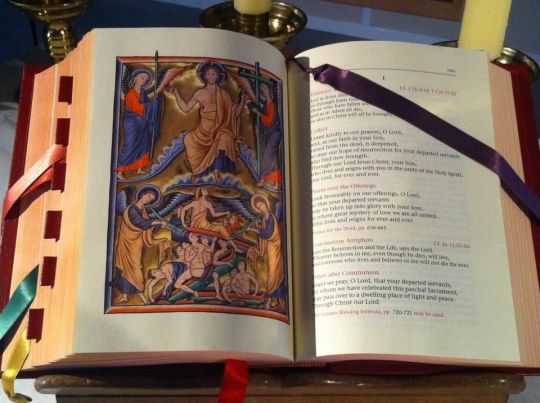
5th January >> Mass Readings (USA)
The Epiphany of the Lord
(Liturgical Colour: White. Year: C(I))
First Reading Isaiah 60:1–6 The glory of the Lord shines upon you.
Rise up in splendor, Jerusalem! Your light has come, the glory of the Lord shines upon you. See, darkness covers the earth, and thick clouds cover the peoples; but upon you the LORD shines, and over you appears his glory. Nations shall walk by your light, and kings by your shining radiance. Raise your eyes and look about; they all gather and come to you: your sons come from afar, and your daughters in the arms of their nurses.
Then you shall be radiant at what you see, your heart shall throb and overflow, for the riches of the sea shall be emptied out before you, the wealth of nations shall be brought to you. Caravans of camels shall fill you, dromedaries from Midian and Ephah; all from Sheba shall come bearing gold and frankincense, and proclaiming the praises of the LORD.
The Word of the Lord
R/ Thanks be to God.
Responsorial Psalm Psalm 72:1–2, 7–8, 10–11, 12–13
R/ Lord, every nation on earth will adore you.
O God, with your judgment endow the king, and with your justice, the king’s son; he shall govern your people with justice and your afflicted ones with judgment.
R/ Lord, every nation on earth will adore you.
Justice shall flower in his days, and profound peace, till the moon be no more. May he rule from sea to sea, and from the River to the ends of the earth.
R/ Lord, every nation on earth will adore you.
The kings of Tarshish and the Isles shall offer gifts; the kings of Arabia and Seba shall bring tribute. All kings shall pay him homage, all nations shall serve him.
R/ Lord, every nation on earth will adore you.
For he shall rescue the poor when he cries out, and the afflicted when he has no one to help him. He shall have pity for the lowly and the poor; the lives of the poor he shall save.
R/ Lord, every nation on earth will adore you.
Second Reading Ephesians 3:2–3a, 5–6 Now it has been revealed that the Gentiles are coheirs of the promise.
Brothers and sisters: You have heard of the stewardship of God’s grace that was given to me for your benefit, namely, that the mystery was made known to me by revelation. It was not made known to people in other generations as it has now been revealed to his holy apostles and prophets by the Spirit: that the Gentiles are coheirs, members of the same body, and copartners in the promise in Christ Jesus through the gospel.
The Word of the Lord
R/ Thanks be to God.
Gospel Acclamation Matthew 2:2
Alleluia, alleluia. We saw his star at its rising and have come to do him homage. Alleluia, alleluia.
Gospel Matthew 2:1–12 We saw his star at its rising and have come to do him homage.
When Jesus was born in Bethlehem of Judea, in the days of King Herod, behold, magi from the east arrived in Jerusalem, saying, “Where is the newborn king of the Jews? We saw his star at its rising and have come to do him homage.” When King Herod heard this, he was greatly troubled, and all Jerusalem with him. Assembling all the chief priests and the scribes of the people, he inquired of them where the Christ was to be born. They said to him, “In Bethlehem of Judea, for thus it has been written through the prophet:
And you, Bethlehem, land of Judah, are by no means least among the rulers of Judah; since from you shall come a ruler, who is to shepherd my people Israel. ”
Then Herod called the magi secretly and ascertained from them the time of the star’s appearance. He sent them to Bethlehem and said, “Go and search diligently for the child. When you have found him, bring me word, that I too may go and do him homage.” After their audience with the king they set out. And behold, the star that they had seen at its rising preceded them, until it came and stopped over the place where the child was. They were overjoyed at seeing the star, and on entering the house they saw the child with Mary his mother. They prostrated themselves and did him homage. Then they opened their treasures and offered him gifts of gold, frankincense, and myrrh. And having been warned in a dream not to return to Herod, they departed for their country by another way.
The Gospel of the Lord
R/ Praise to you, Lord Jesus Christ.
Noveritis
Announcement of the date of Easter and movable feasts
(After the Gospel, following a long-established custom of the Church, the deacon or cantor may proclaim the movable feasts of the current year, in the following form)
Know, dear brethren (brothers and sisters), that, as we have rejoiced at the Nativity of our Lord Jesus Christ, so by leave of God’s mercy we announce to you also the joy of his Resurrection, who is our Saviour. On the fifth day of March will fall Ash Wednesday, and the beginning of the fast of the most sacred Lenten season. On the twentieth day of April you will celebrate with joy Easter Day, the Paschal feast of our Lord Jesus Christ. On the first day of June will be the Ascension of our Lord Jesus Christ. On the eighth day of the same month, the feast of Pentecost. On the twenty-second day of the same month, the feast of the Most Holy Body and Blood of Christ. On the thirtieth day of November, the First Sunday of the Advent of our Lord Jesus Christ, to whom is honour and glory for ever and ever. R/ Amen.
2 notes
·
View notes
Text
PROFILE
GROUP NAME: 4MINUTE
FANDOM: 4maniacs
FANDOM COLORS: Royal Purple
MEMBERS: 4
COMPANY: Blue Entertainment is a Japanese company owned by CEO Ren Hashimoto
DEBUT DATE: May 08, 2020
DEBUT SONG: Black Mamba
CONCEPT: Girl Crush/ Cute but Savage
LANGUAGES: English, Korean, Japanese, Spanish, and Italian.


4MINUTE MEMBERS PROFILE:

Birth Name: Amara Grace Angelos
Stage Name: Amara
Position: Leader, Main Dancer, Lead Rapper, Sub-Vocalist, Visual, Face of the Group, Center
Birthday: July 30th, 2001
Zodiac Sign: Leo
Height: 167.8 cm (5'6″)
MBTI Type: ISTJ
Nationality: Korean-American
Representative Symbol: Star 🌟
Representative Animal: Panda 🐼
Representative Number: 01
Representative Color: Blue 💙 Which means stability and mystery.
Amara Facts:
She was born in Seoul, South Korea, but was given to adoption when she was 8 months old by her birth mother. When she was 10 months old, she got adopted by a couple and taken to San Antonio, Texas, by her adoptive parents.
Her adopted father serves as U.S Marine, and her adopted mother is a lawyer.
She has 4 adopted older brothers.
She has a black belt in taekwondo.
She trained for a year.
Golden leader is her nickname given by the CEO of Blue Entertainment.
She is Catholic.
She speaks English, Korean, Spanish, and Japanese.
Her favorite artists are Shawn Mendes, Dua Lipa, Ariana Grande, Little Mix, The Beatles, Journey, EXO, and Shinee.
She wants to travel to Italy.
Her favorite season is spring.
Her favorite animals are pandas, penguins, and dogs.
Her favorite food is Mexican and Korean food.
Her favorite genre of film is comedy and horror.
Her first impression about Monique: "She looks so cute."
Her first impression about Erica: "Woah, she's very small."
Her first impression about Danielle: "We both were very shy and polite with each other."
Amara loves pistachio ice cream.
When she is home, she tends to watch reruns of K-Dramas.
On important days, she always makes sure to wear her rosary ring.
She relieves stress by eating good food and working out.
She likes to read in a quiet place.
She thinks her strength is caring for those around her and being quick-witted.
She thinks that her weakness is that she tends to be very shy and she has a bad memory.
She wants to learn to cook, how to be a producer, and how to compose songs.
Her Ideal Type: Someone who's a gentleman who only likes her and is taller than her. When asked to pick a celebrity that fits her ideal type, she always mentions Lee Taemin from Shinee.

Birth Name: Danielle Rose Adams
Stage Name: Dani
Position: Main Rapper, Sub-Vocalist
Birthday: March 21th, 1999
Zodiac Sign: Aries
Height: 167.8 cm (5'6″)
MBTI Type: INFJ
Nationality: American
Representative Symbol: 🍷Wine
Representative Animal: Bunnie🐰
Representative Number: 21
Representative Color: Gold 💛 Which means englightment and wisdom.
Danielle Facts:
She was born in Washington D.C. but when she was 5 years old, her and her parents moved to Los Angeles, California.
Her father is a fashion designer, and her mother used to be a model, but now helps out her husband with his fashion business.
She is an only child.
She trained for 5 years.
Her nicknames are Dani and Ms. Worldwide because she has traveled all around the world. [Nickname given by the girls]
She speaks English, Japanese and understands a little bit of Spanish.
She prefers rap better than singing or dancing.
She can play guitar.
She likes to listen to rock music, especially Black Veil Brides and The Rolling Stones.
Her favorite color is Yellow 💛
Her favorite season is autumn.
Her favorite foods are sweet and salty foods.
Her favorite movie is Deadpool.
Dani's first impression about Amara: "Woah, she's so pretty. We were both very shy!"
Her first impression about Monique: "I first thought she was quiet and calm... Turns out she isn't."
Her first impression about Erica: "She is really kind and quiet."
She likes taking pictures, preferably of other people.
When she is trying to relieve stress, she likes to shop and/or eat something sweet.
Her Ideal Type: A gentlemen and someone funny and respectful. When asked to pick a celebrity that fits her ideal type, she once mentioned Ryan Reynolds.

Birth Name: Erica Brooke Garcia
Stage Name: Erica
Position: Main Vocalist
Birthday: October 03th, 1999
Zodiac Sign: Libra
Height: 165cm (5'5″)
MBTI Type: ESTP
Nationality: American-Mexican
Representative Symbol: Cresent Moon 🌙
Representative Animal: Dolphin 🐬
Representative Number: 10
Representative Color: Green 💚 Which means balance and harmony.
Erica Facts:
She was born and raised in Albuquerque, New Mexico.
She has an older brother.
Her father is a science teacher, and her mother is a High School Principal.
Erica trained for 3 years.
Her nickname is Tiny.
She speaks English, Japanese, and a little bit of Spanish. She says that she understands it better than speaks it.
Her favorite film genre is action.
Her favorite artists are SZA, Bruno Mars, Lady Gaga, Big Time Rush, The Jonas Brothers, Stephen Sanchez, and One Direction.
She likes eating chocolate and sweets.
Favorite Foods: Chocolate, snacks, jelly, smoothies, lasagna, cake, bread, and cookies.
Her favorite season is winter.
Her favorite movies are all the Fast and Furious and Harry Potter movies.
Erica's first opinion about Dani: "She has really long hair."
Her first opinion about Amara: "Is she real or a fictional character?"
Her first opinion about Monique: "Her arms and legs are long."
Her Ideal Type: Someone thoughtful, funny, cute, and respectful. When asked to pick a celebrity that fits her ideal type, she mentioned Dylan O'Brien.

Birth Name: Monique Allison Jones
Stage Name: Monique
Position: Lead Vocalist and Lead Dancer
Birthday: December 16th, 2002
Zodiac Sign: Sagittarius
Height: 170cm (5'7″)
MBTI Type: INFP
Nationality: American- Italian
Representative Symbol: Butterfly 🦋
Representative Animal: Unicorn 🦄
Representative Number: 12
Representative Color: Pink 💗 Which means love and compassion.
Monique Facts:
She was born and raised in San Diego, California.
She has an older brother and older sister and a younger brother.
Her parents own an Italian restaurant where her father is the chef.
She speaks English, Japanese and Italian.
Her hobby is cooking.
Her favorite fruits are watermelon and strawberries.
She can play the piano.
Monique trained for 4 years.
The artists she likes are Ariana Grande, Niki Minaj, Rihanna, Beyoncé, and One Direction.
She can play the piano and the guitar.
Her favorite season is summer.
Her favorite food is Chinese food.
She would love to travel to England.
Her first opinion about Erica: "She looks like a small hamster."
Monique's first opinion about Amara: "Did she come out of a manga?"
Her first opinion about Danielle: "She has long legs."
She likes buying vintage clothing.
The girls have said that Monique is the girly girl out of the group and loves anything pink.
Her favorite movie is "Titanic" because the movie made her believe in love.
Her Ideal Type: Someone thoughtful, respectful, and sexy. When asked to pick a celebrity that fits her ideal type, she once mentioned Logan Lerman.
#kpop au#aespa au#gg moodboard#fanfic#landon barker#noah beck#one shot#f/o imagines#alternate universe#oc#oc x reader#oc x character#fanfiction#character profile
2 notes
·
View notes
Text
September
September is here and I know this post is late, but I had to take a slight social media detox! I swear once September hits I am all Fall, y’all!! I’m about all things apple, pumpkin, fall leaves, sunflowers, soup, etc! Did you know that apples (and apple trees) are associated with love, health, divination, rebirth and renewal, life, learning, and so many other things? The original bobbing for apples game was a form of slight divination, even! It was said that marriage would come to the first person to bite into the apple while bobbing. Also, if you cut into an apple, you’ll find a pentacle type star!
Correspondences of September are sapphire and sardonyx for crystals, the bear and owl for animals, flowers are morning glory and aster, and the zodiac sign is Virgo.
Let’s talk about some days in September:
Not only is Labor Day the 2nd, but also the Celtic Tree Month of Vine begins…happiness and wrath are both symbolized with the vine, garden magic, magic for joy and happiness but also wrath, rage, anger.
Magical influences for this are empowerment, inner growth, introspection, and prophecy.
Sept 4th is bring your manners to work day (I liked this one, cause I’m constantly reminding myself to have manners in moments where people are pissing me off lol.)
Sept 7th national salami day and world beard day (I liked these two because we used to call our younger sister “salami” to piss her off when we were all younger and we still sort of joke about it to this day… and my boyfriend has a beard that I just love. I love feeling it, smelling it, looking at it…lol!)
Sept 8th grandparents day
9/11… a tragic day that affected so many lives in one way or another! On this day remember all those who lost their lives due to this tragic event and the war it caused!
Friday the 13th
FULL MOON in Pisces on Sept 17, Harvest moon aka the nut moon, barley moon, or wine moon (love that!), the color for this full moon is brown and crystals are carnelian, cat’s eye, iolite, lapis lazuli, peridot, sapphire, blue spinel, blue tourmaline, and zircon
Magickal influences from this moon are confidence, the home, manifestation, protection.
This is a Moon of wisdom, take this time to reflect back on lessons learned this past year, darker days are coming which is good for shadow work.
September 18th NATIONAL CHEESEBURGER DAYYYY
September 21st International Day of Peace
Sept 22 is Mabon, also known as the autumn (or Fall) equinox – this is a time where night and day or light and dark are balanced. This is a sort of mid-harvest festival, we are celebrating the second of 3 harvest festivals. I’ve read that there is a slight connection to Mabon for how Oktoberfest was created, by the Bavarians. They start celebrating this in the last week of September.
Celebrate Mabon and give thanks to the Earth for abundant crops, practice gratitude, give blessings, share with the less fortunate. When canning, infuse your recipes with magickal influences and charm your jars.
Mabon is also one of those “liminal times” or an in-between time. These are powerful times for spell-work, rituals, and magick in general.
Colors for Mabon are blue, brown, gold, maroon, orange, violet, and yellow
Plants, herbs, etc: aster, marigolds, sage, ivy, grape, fern, blackberry/bramble, chrysanthemum, grains, thistle, and trees are cedar, hazel, aspen, maple, oak, myrtle, and locust
gems: amethyst, topaz
animals: hawk, swans, swallows, geese, dogs, wolves
Element: water
Magickal influences: accomplishment, agriculture, balance, goals, gratitude, grounding
Deities are: Epona, Inanna, Ishtar, Kore, Modron (Celtic Great Earth Mother Goddess), the Morrigan, Persephone, Bacchus, Dionysus, Dumuzi, the Green Man, Hermes, Thoth, Mabon (translates to the divine son) is the son of Modron and he is associated with the element of water, grapes, ivy, dogs, horses, salmon and his magical influences are hunting, darkness, death, freedom, harmony, innocence, justice, the otherworld or underworld, quests, contacting spirits, strength, truth, and youth.
Ways you can celebrate Mabon:
Make a simmer pot with apples, cloves, cinnamon, and nutmeg, vanilla, star anise, orange slices.
Host a harvest dinner and include apples, squash, corn, grains, root vegetables like carrots potatoes and onions, grapes and wine, nuts, pomegranates, mead, spiced teas.
Make a hearty stew with fresh baked bread, apple pie, mashed squash, mulled wine
Make a cornucopia, go to a pumpkin patch and farmer’s market, go for a fall nature walk, donate food, focus on balance in your life, write a gratitude list, decorate your altar for Mabon with apples, candles that are brown, orange, and gold, marigold and sunflowers, leaves, acorns, grape vines, a deity statue. Celebrate by giving thanks for the abundance and good in your life, and meditate on the things on the things from this past year you'd like to let go of!
Sept 30th Celtic tree month of Ivy begins which symbolizes life, death, and rebirth, spell work during this time would be great for self-work, healing, banishing toxicity, protection, binding spells
Magical influences during this time: decisions and introspection, growth, learning, developing skills.
September in general is a good time to work on magick and intentions for the home.
I feel like 2 of the biggest intentions you can work on in September however, are balance and change, so I’m going to share a spell for this month that I created!
Things you’re going to need: leaves, something to write with, sage, basil, apple, orange candle, oil, sunflowers.
Dress your orange (for balance and change) candle with oil of your choosing and sage for a clear mind, basil for opening yourself to receive messages, and sunflowers for overcoming obstacles.
Core your apple (for peace, rebirth and renewal, self-work) and place your candle inside. You’re basically using this apple as your candle holder!
Light your candle and meditate on the areas in your life that need balance and/or change. When you are done, write your setbacks and obstacles that you want to overcome (to make these changes and bring this balance) onto the leaves. Hold the leaves into your hands and let the wind take them away!
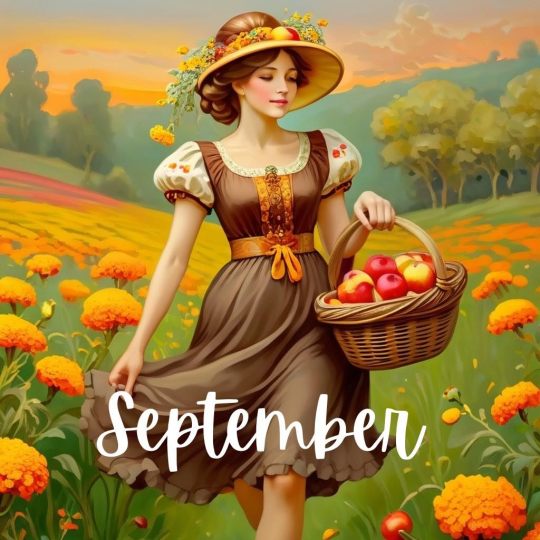
4 notes
·
View notes
Text
Monday, August 26, 2024 Canadian TV Listings (Times Eastern)
NEW TO AMAZON PRIME CANADA/CBC GEM/CRAVE TV/DISNEY + STAR/NETFLIX CANADA:
AMAZON PRIME CANADA NO GAIN, NO LOVE
NETFLIX CANADA HOW TO LOSE A GUY IN 10 DAYS
2024 US OPEN TENNIS (TSN/TSN3/TSN) 11:00am: Early Round Coverage Day #1 (TSN/TSN2/TSN3/TSN4) 7:00pm: Early Round Coverage Day #1 - Primetime
MLB BASEBALL (SN) 2:00pm: Jays vs. Red Sox - Game 1 (SN) 6:30pm: Jays vs. Red Sox - Game 2 (SN Now) 6:30pm: Astros vs. Phillies (SN1) 6:30pm: Yankees vs. Nationals (SN1) 9:30pm: Rays vs. Mariners
2024 AKC DIVING DOGS CHALLENGE (TSN5) 2:00pm
WNBA BASKETBALL (TSN5) 7:30pm: Fever vs. Dream
BERING SEA GOLD (Discovery Channel Canada) 8:00pm (SEASON PREMIERE): Chaotic El Niño conditions impact the ice, creating dangerous pressure ridges and flipping the gold miners' game plans upside down as some are forced off their claims.
CURSED GOLD: A SHIPWRECK SCANDAL (Nat Geo Canada) 9:00pm (SERIES PREMIERE): A maverick scientist begins his quest to find a shipwreck full of gold.
FACE TO FACE WITH SCOTT PETERSON (Slice) 10:00pm (SERIES PREMIERE): Expectant mother Laci Peterson vanishes in Modesto, California, on Christmas Eve 2002; while the community desperately searches for her, the police narrow their focus on her husband Scott, and the case becomes a national media sensation.
HISTORY'S GREATEST ESCAPES WITH MORGAN FREEMAN (History Canada) 10:00pm (SEASON PREMIERE): A lone wolf prisoner, with aspirations of writing crime novels, ends up the star of his own break out story when he figures out how to escape from one of Mississippi's oldest and most notorious prison farms, Parchman Penitentiary.
DARK SIDE OF THE RING (Much) 10:00pm (SEASON 4 PREMIERE): The teenage romance of wrestling prodigy Chris Candido and Tammy Sunny Sytch, his love-to-hate manager, gets torn apart by infidelity, addiction and mutual self-destruction.
EAST HARBOUR HEROES (Discovery Channel Canada) 10:00pm: Hundreds of skippers prepare to launch their biggest fisheries but an ongoing shore-side debate threatens to halt everyone's livelihoods.
#cdntv#cancon#canadian tv#canadian tv listings#east harbour heroes#tennis#mlb baseball#wnba basketball
2 notes
·
View notes
Note
ACHIEVED//
Memories Served
ACHIEVED for a scene from my muse's past in which they completed / achieved something they were proud of
-----
"A high advisor?" the ivory monkey questioned, tilting her head.
Before her and the humans she lived with stood a king, one who ruled these lands in particular. A thick crown of gold ringed around his head with red stone at its center, to mark his status among the people. Said material also fashioned his earrings and woven necklaces went around neck. A cape made of leopard's pelt draped down his bare backside and onto floor, whilst orange skirt along with sandals kept his modesty. Despite the greying hairs on his beard, man was well built for his age. However such factors did not goad him into hubris, as evident by two soldiers who stood vigilant on his sides.
The groups were currently upon a balcony; overlooking capital, as sun began to set on horizon. Being called here instead of throne room was a change in their usual exchanges. Alkebu-lan could still recall the day she offered herself to help discover disappearing treasure's whereabouts. How amusing his surprise was! After her bargaining with the Grootslang, she, mother and siblings ended up visiting palace a few more times to help with certain matters.
This time however the king deigned to inform them on upcoming ideas he wished to lay out. Specifically, with monkey becoming a new, special category of advisor amongst his counsel.
The ruler nodded, his dark skin shining against golden glow of atmosphere.
"Yes. I have contemplated this for quite some time now, ever since your feat with finding and returning our jewels. Your recent accomplishments with the destruction of the popobawa however has left little room for doubt." As he explained this, the king poured banana wine into his chalice. He turned his head, gazing upon bustling town with sincerity. "My kingdom has always been... divided, plagued with warring tribes. It has long been my dream to move this nation forward and establish peace. With your help, lucky monkey I believe I can accomplish just that."
At this, Alkebu-lan frowned in contemplation.
"That sounds like quite the noble dream, my king. I cannot however leave those who first found me behind."
At this the king chuckled and set his cup down. "I am aware of your loyalty, baboon. It is one of your more endearing qualities... and it is very well placed. That is why I propose this idea."
He moved over besides surrogate mother, taking her hand in his. Both gazed at each other and Alkebu-lan saw a familiar expression on Andrietta's visage- one she wore when speaking of late husband. Now however there was less sadness.
"I will take captain Andrietta as my wife and her adopted children shall live in the palace with me. That is-" he brought bald woman's hand towards face and bowed his head, pressing nose's tip against knuckles with closed eyes; a sign of submission in their culture. "If she will have me."
At this, Andrietta's lithe fingers caressed his cheek drawing his rusty eyes to look into her caramel jewels. They were loving and lips smiled.
"If my king thinks me worthy, I will try not to disappoint."
"Wait-" chimed in the disbelieving voice of the young man, Tebello. "We are going to live in the palace now!?"
At this the young girl behind him squealed, before tackling Alkebu-lan into a hug.
"By the stars! Sister! Sister! We really are going to be living here! Mama found a man! We are going to become royalty!" Thandiwe exclaimed gleefully.
While surprised at first, her little sister's joy was infectious. Chitters escaping Alkebu-lan, she scooped girl into an embrace and spun around.

"Well if you put it that way, who am I to refuse?"
No longer would this family worry about gathering food, or monsters prowling in the night. Now, they would be safe with bellies full.
#a person is a person because of other people (ic)#knowledge is a garden. if it isn't cultivated you can't harvest it (answered ask)#lon3lyqu3en#((she felt so happy that her mother and siblings wouldn't be at risk to the elements anymore))#((even to this day she considers it one of her greatest accomplishments))
2 notes
·
View notes
Text
New Releases July 18, 2023

Hirano and Kagiura vol. 3 by Shou Harusono
It just might work out if I try hard enough...At least, that’s what Kagiura keeps telling himself as he works himself to the bone studying for his final exams. After all, that’s the only way to protect his dorm life with his dear upperclassman. But although Hirano agreed to another year of their roomshare, does he really understand what it means to live with the person who’s crushing on him...?
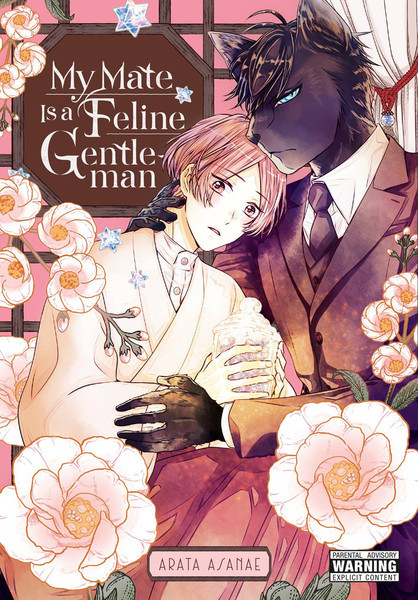
My Mate is a Feline Gentleman by Arata Asanae
When Toushirou is hired as a servant for beastman diplomat Alex, he fears the very worst. As an omega, he’s gotten used to being treated as a mere plaything, and he prepares to once again “serve” his feline master. But to his surprise, Alex is appalled by the treatment of omegas in Japan and treats him with a kindness he’s never experienced before. Little by little, Toushirou’s feelings begin to change...

Namekawa-san Won't Take a Licking! vol. 4 by Rie Ato
FINAL VOLUME
Namekawa-san seems to get more oddball groupies by the day, and boy, do they love making her life crazy! But when a new girl enters the scene, it’s clear she’s not there to make nice. Claiming to know about Namekawa-san’s past, she breaks up their tight-knit group with ease. Too bad for her though, Namekawa-san always shines brighter the more you try to give her a licking! Just how will she fend off this final threat?!
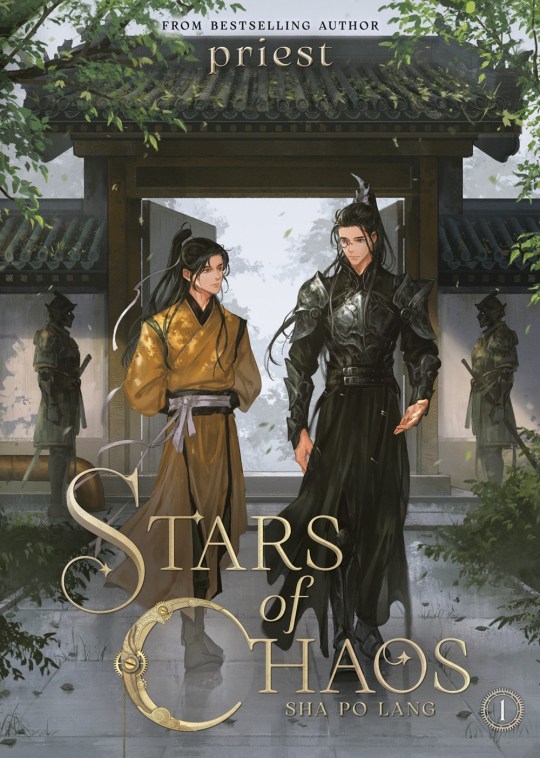
Stars of Chaos: Sha Po Lang vol. 1 (novel) by Priest
The discovery of violet gold, a vital fuel for steam-powered machines, propelled the empire of Great Liang into an age of prosperity. But for Chang Geng, a young man raised on the impoverished northern border, the concerns of the empire are as distant as the stars above.
When raiders from the north attack Chang Geng’s small village, he discovers that the life he knows is a lie. His mother, his teacher, and even his godfather whom he trusted more than any other, Shen Shiliu, are not what they seem. As enemy nations close in, Chang Geng follows his godfather to the heart of the imperial capital, where a greater fate lies in store for him.
The Seven Seas English-language editions of these novels will feature the uncensored text in deluxe paperbacks with exclusive new covers and interior illustrations. The ebooks will also be available on digital platforms.

The Summer Hikaru Died vol. 1 by Mokumokuren.
Two boys lived in a village: Yoshiki and Hikaru. The two did everything together...until the day Hikaru was encompassed by a mysterious light. That was when everything changed—Hikaru most of all. Yoshiki still wishes from the bottom of his heart to always stay by his side...but is there even a Hikaru left to be with?
12 notes
·
View notes